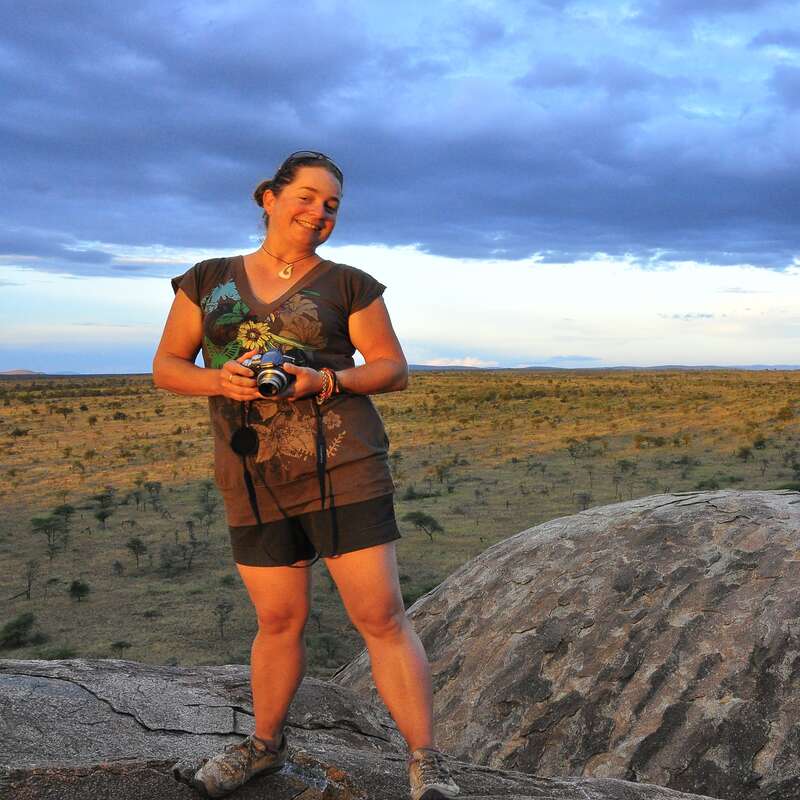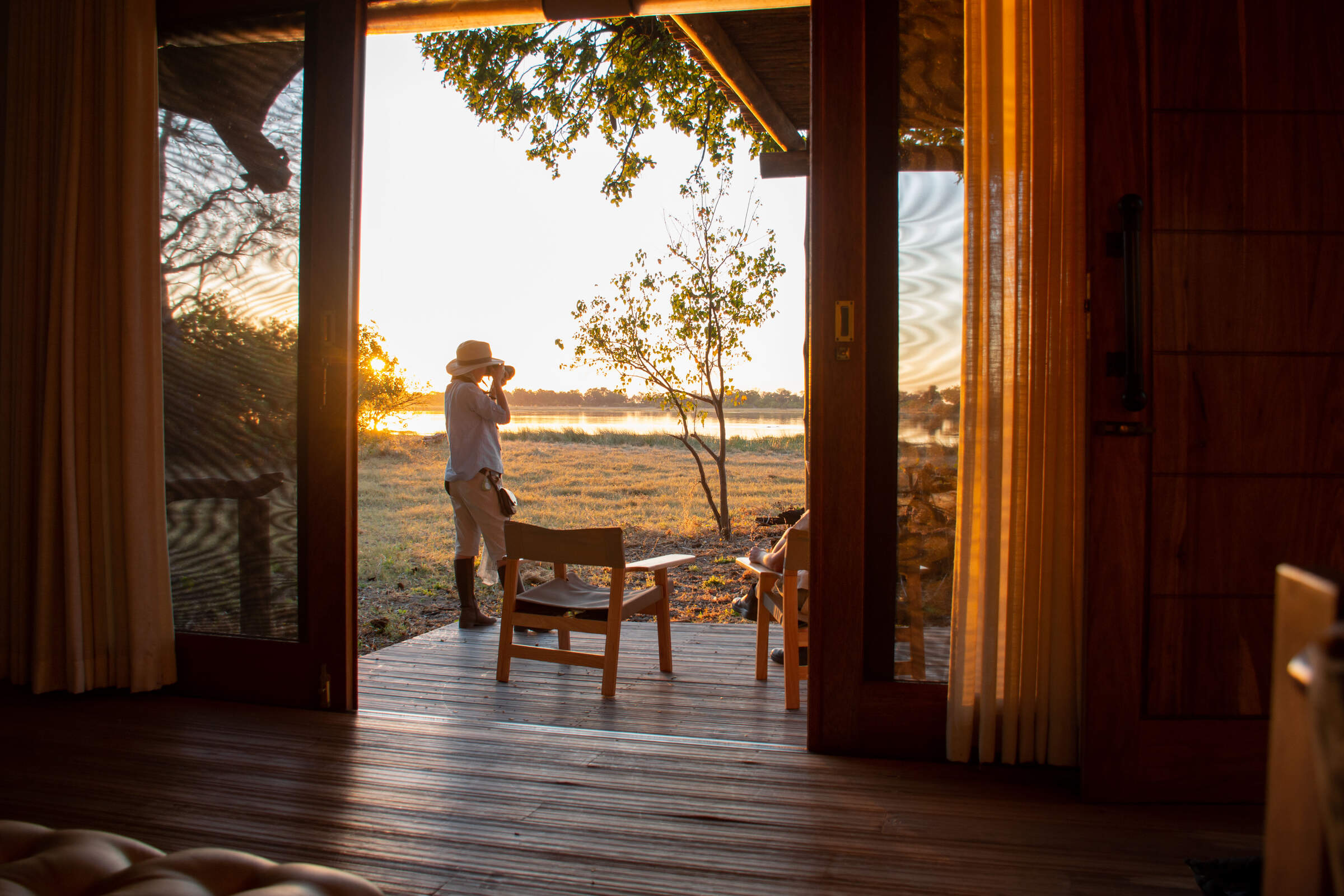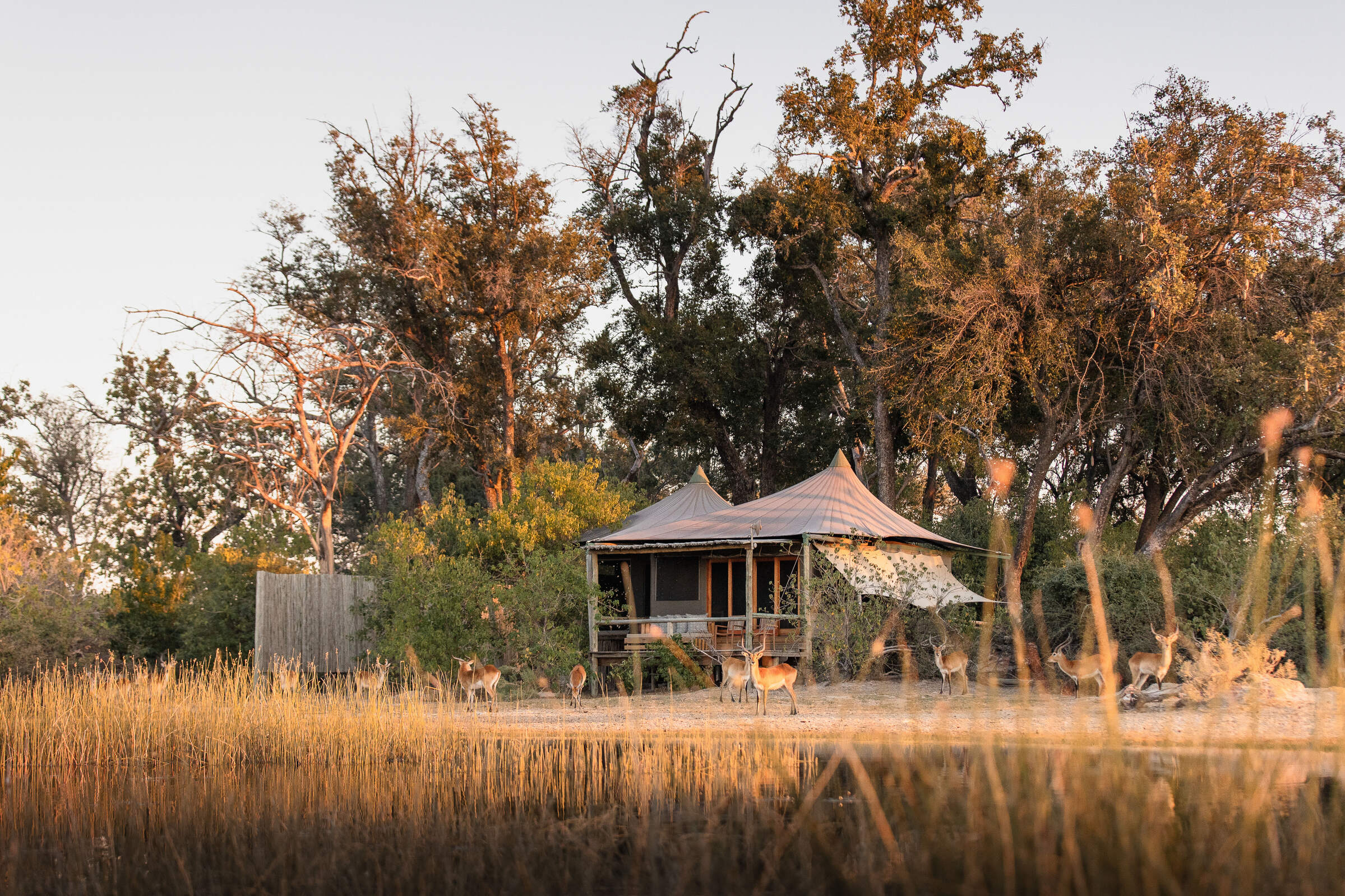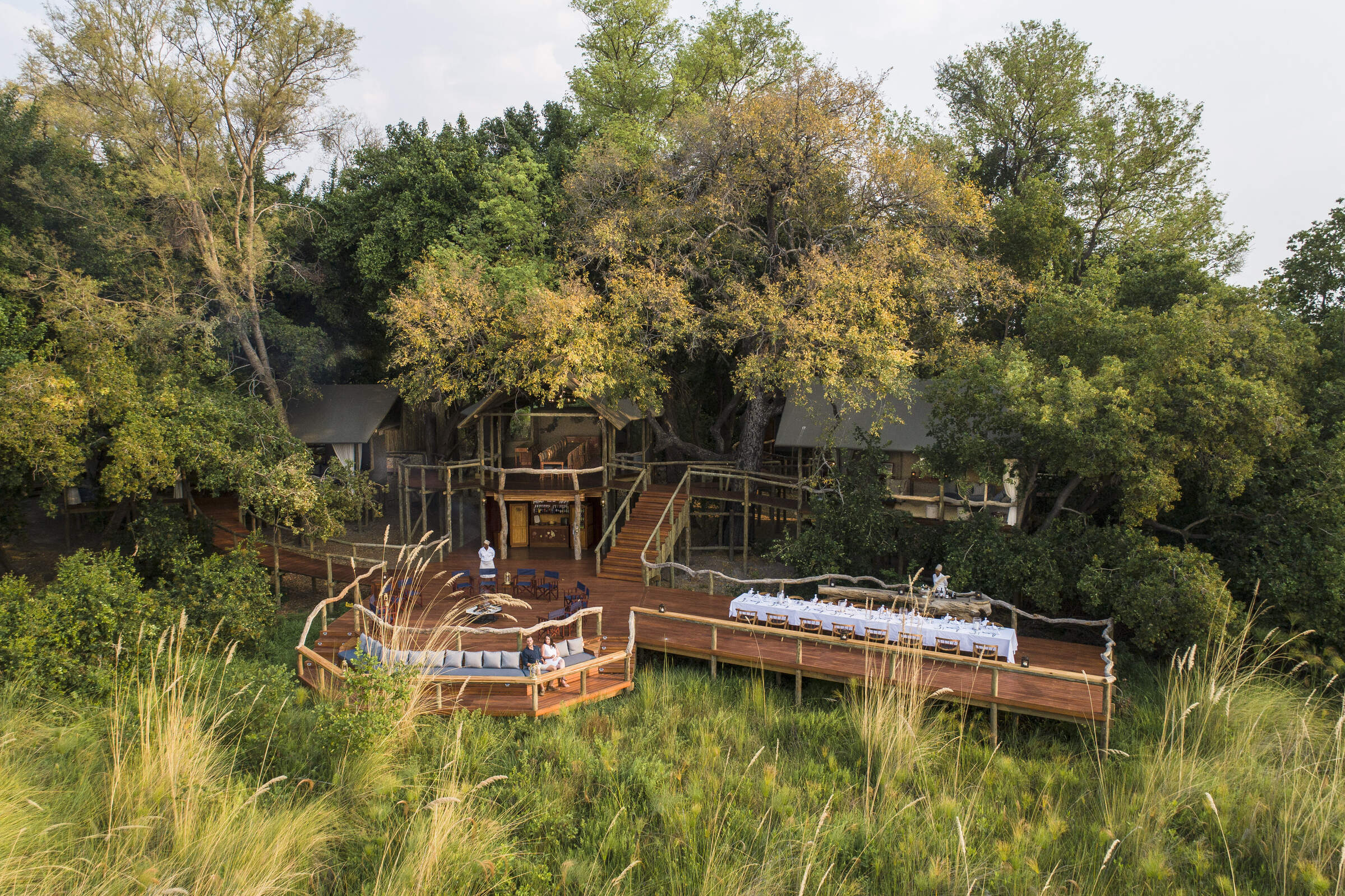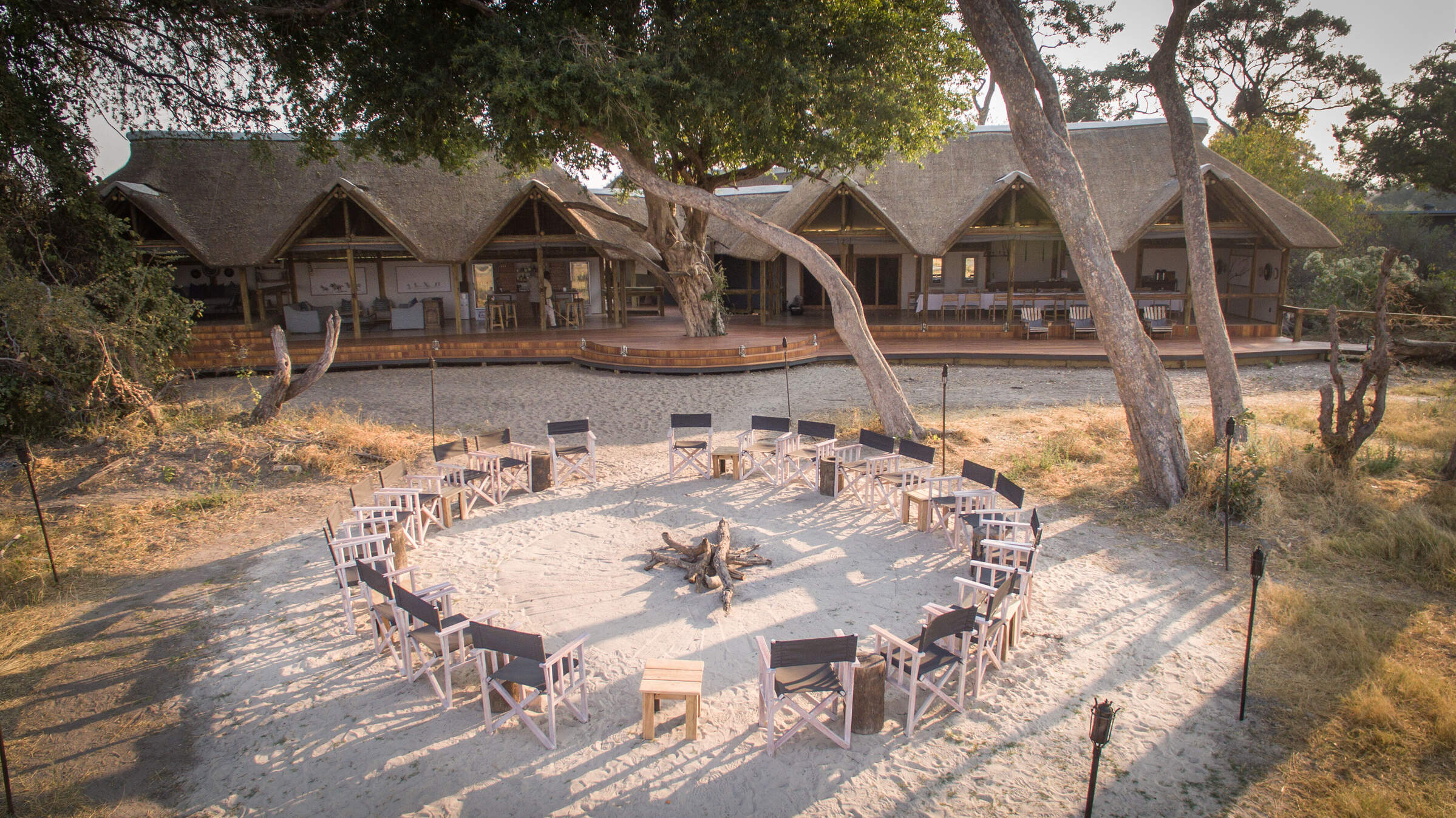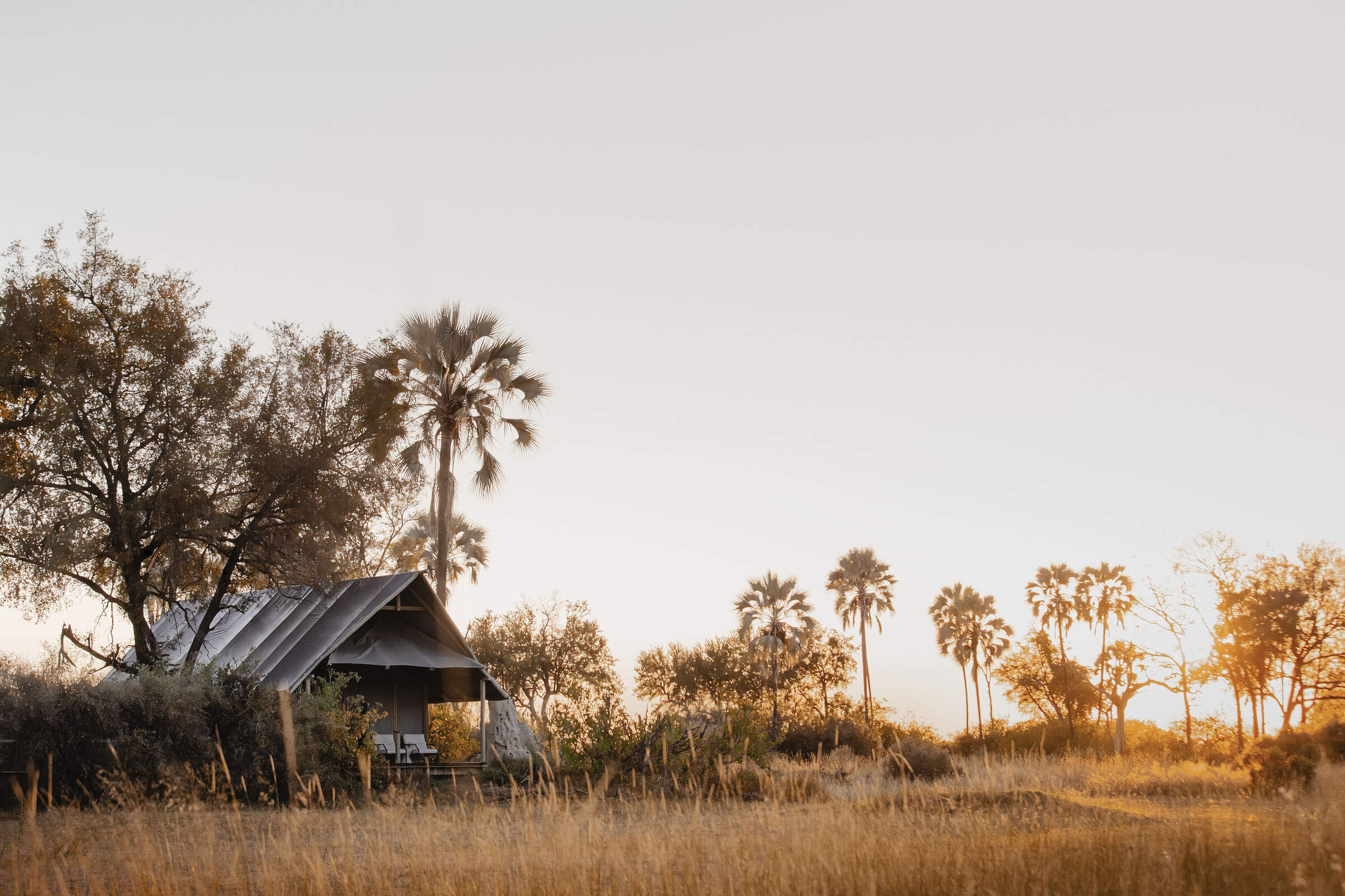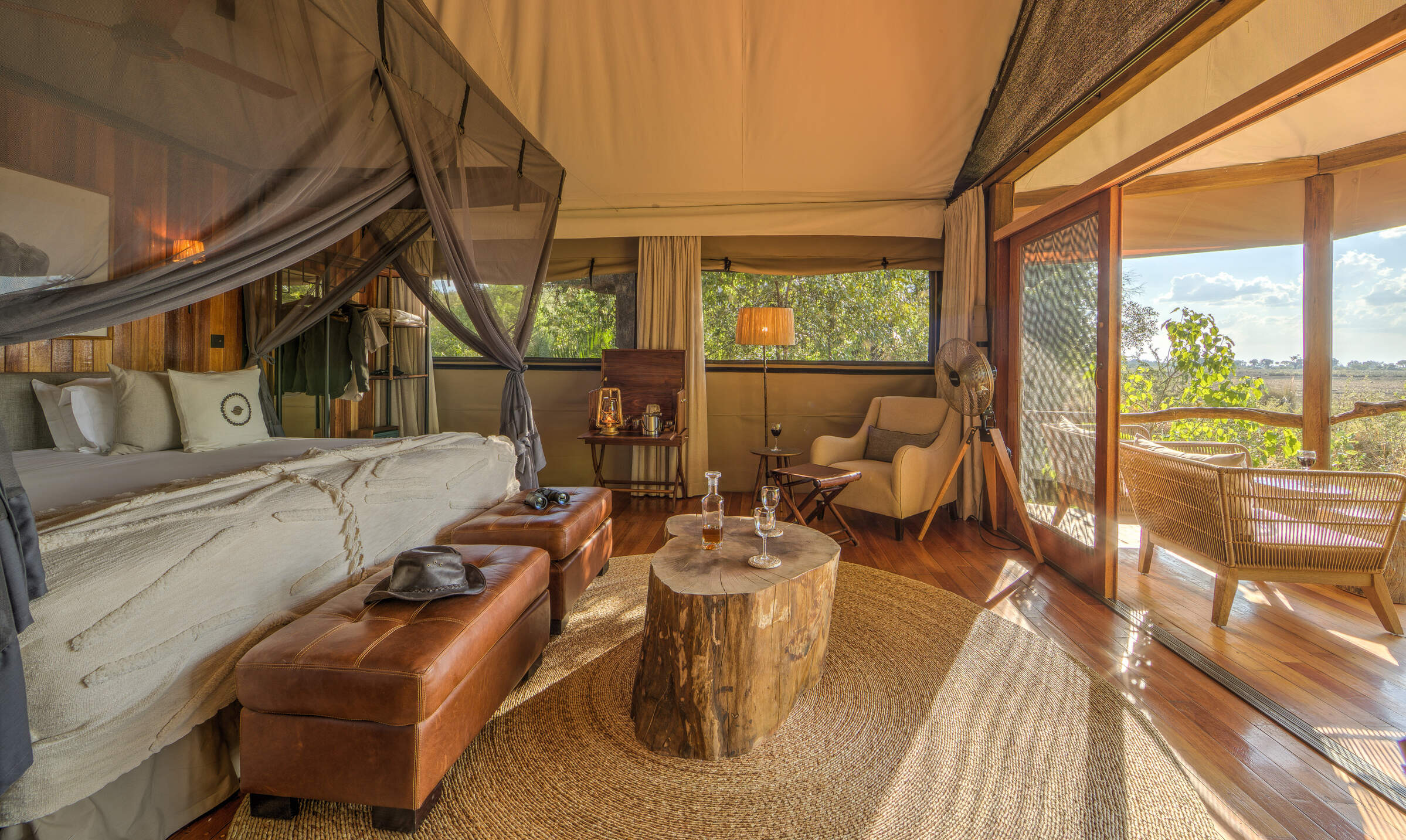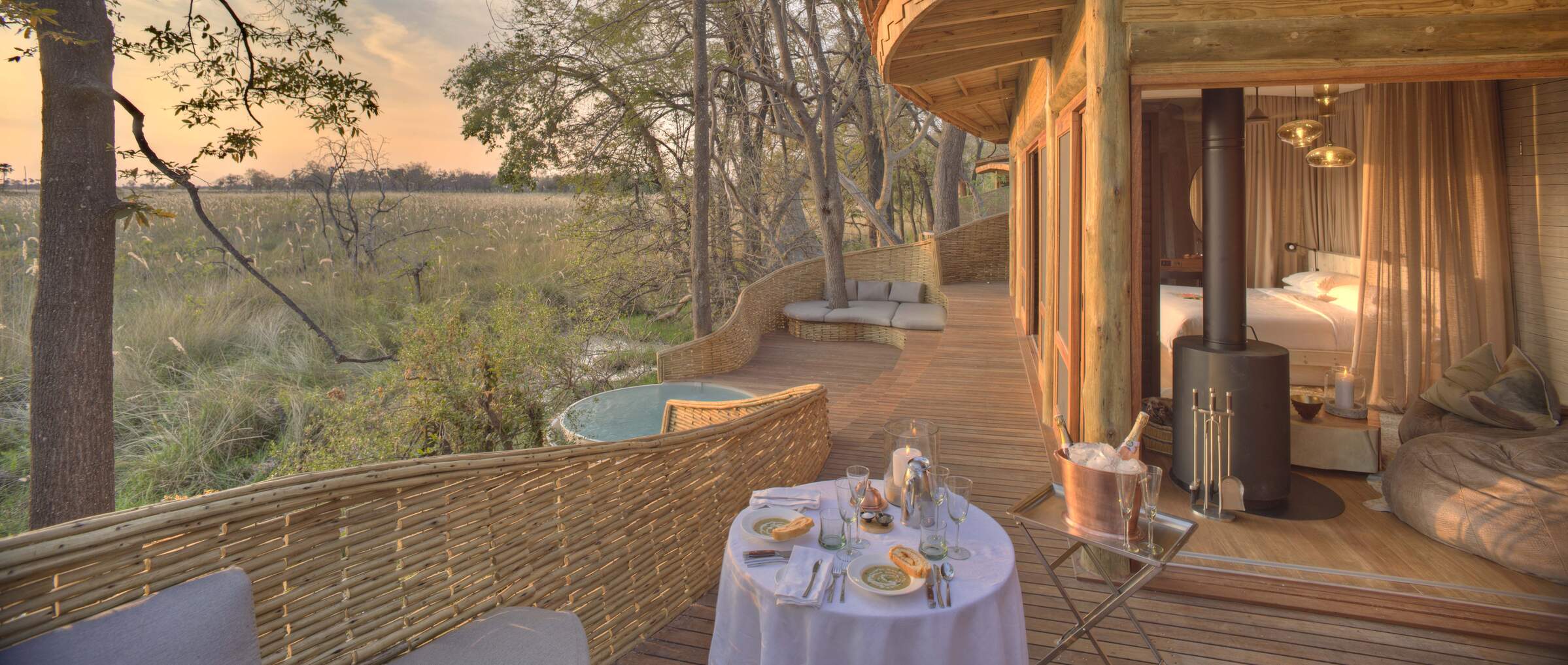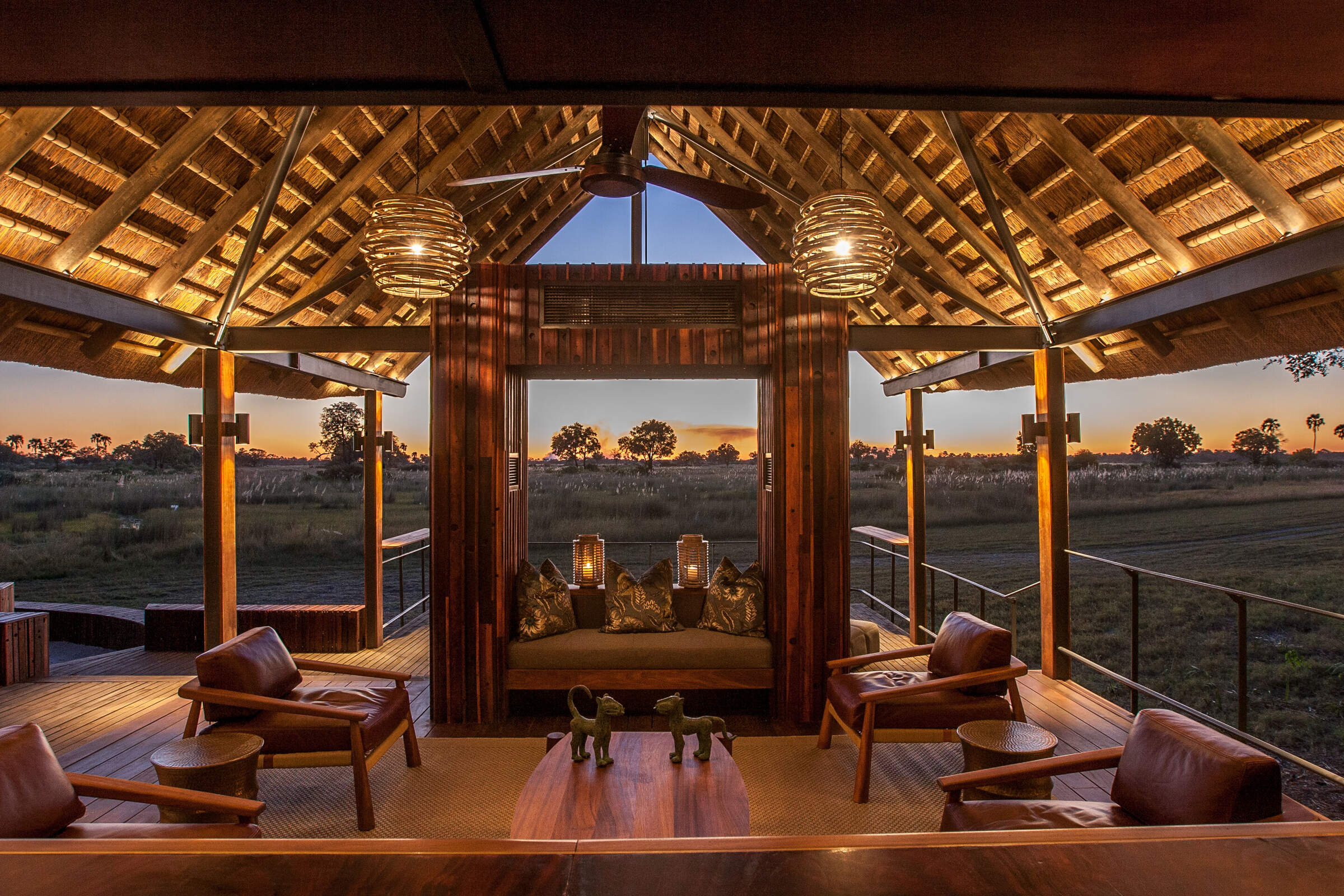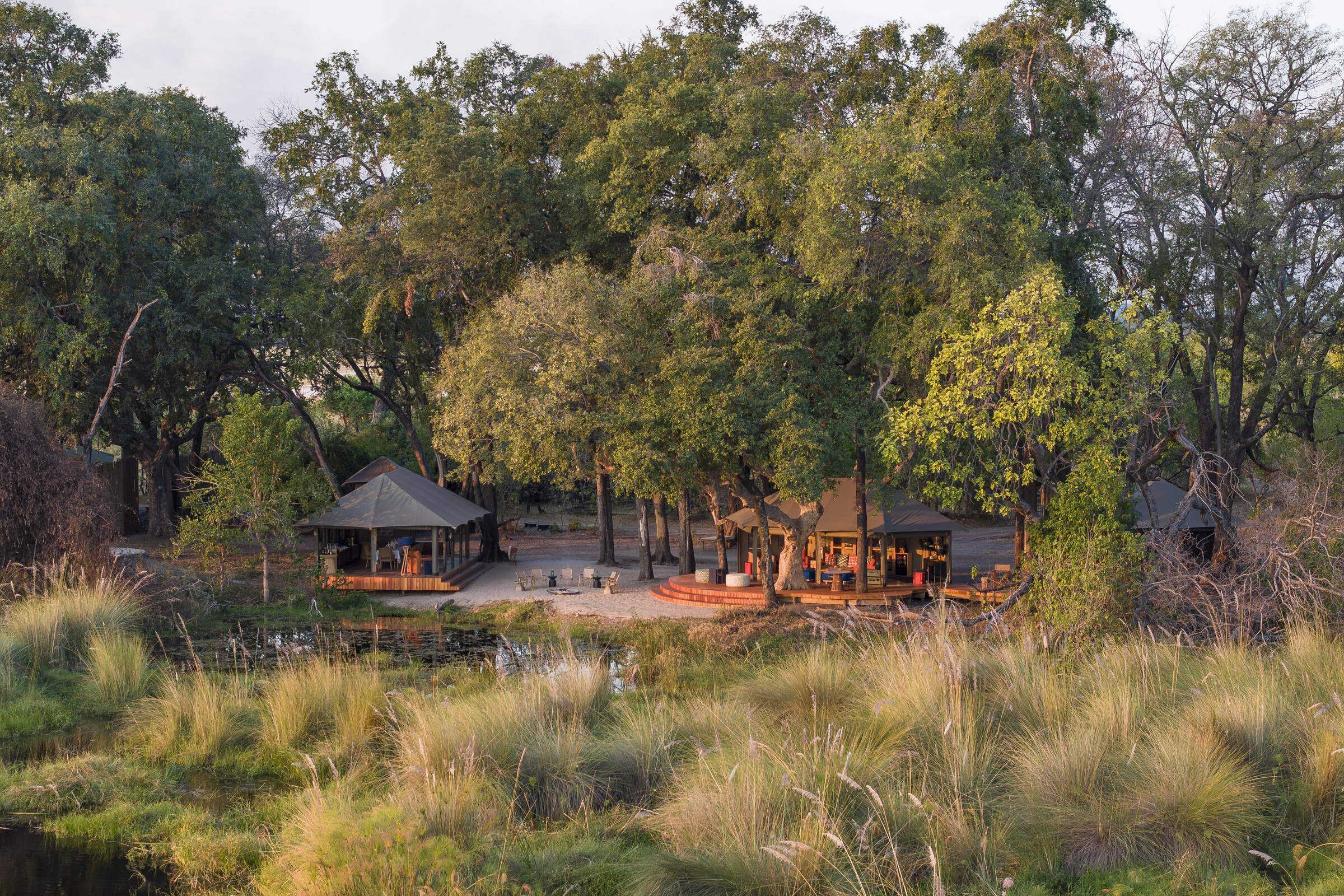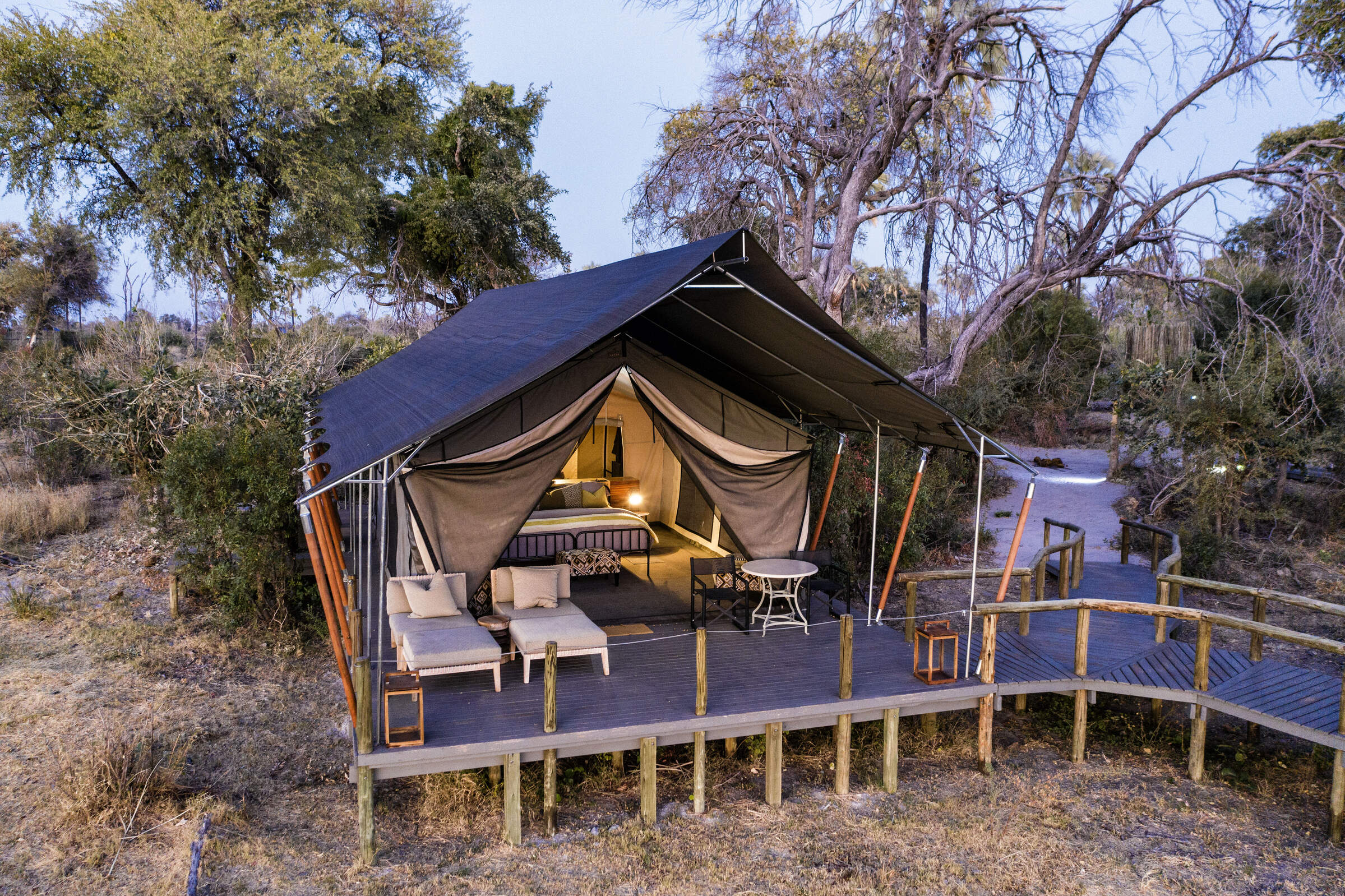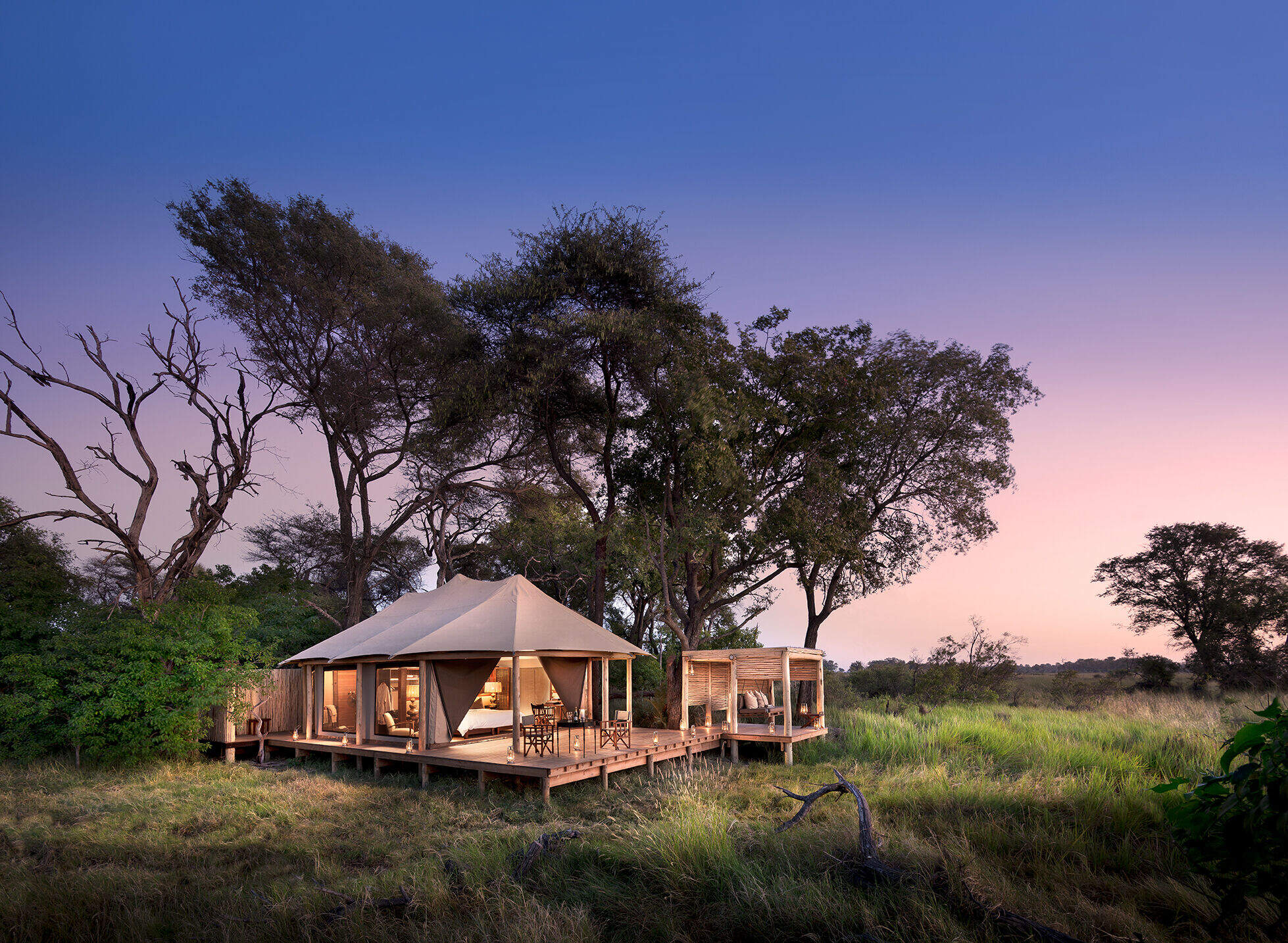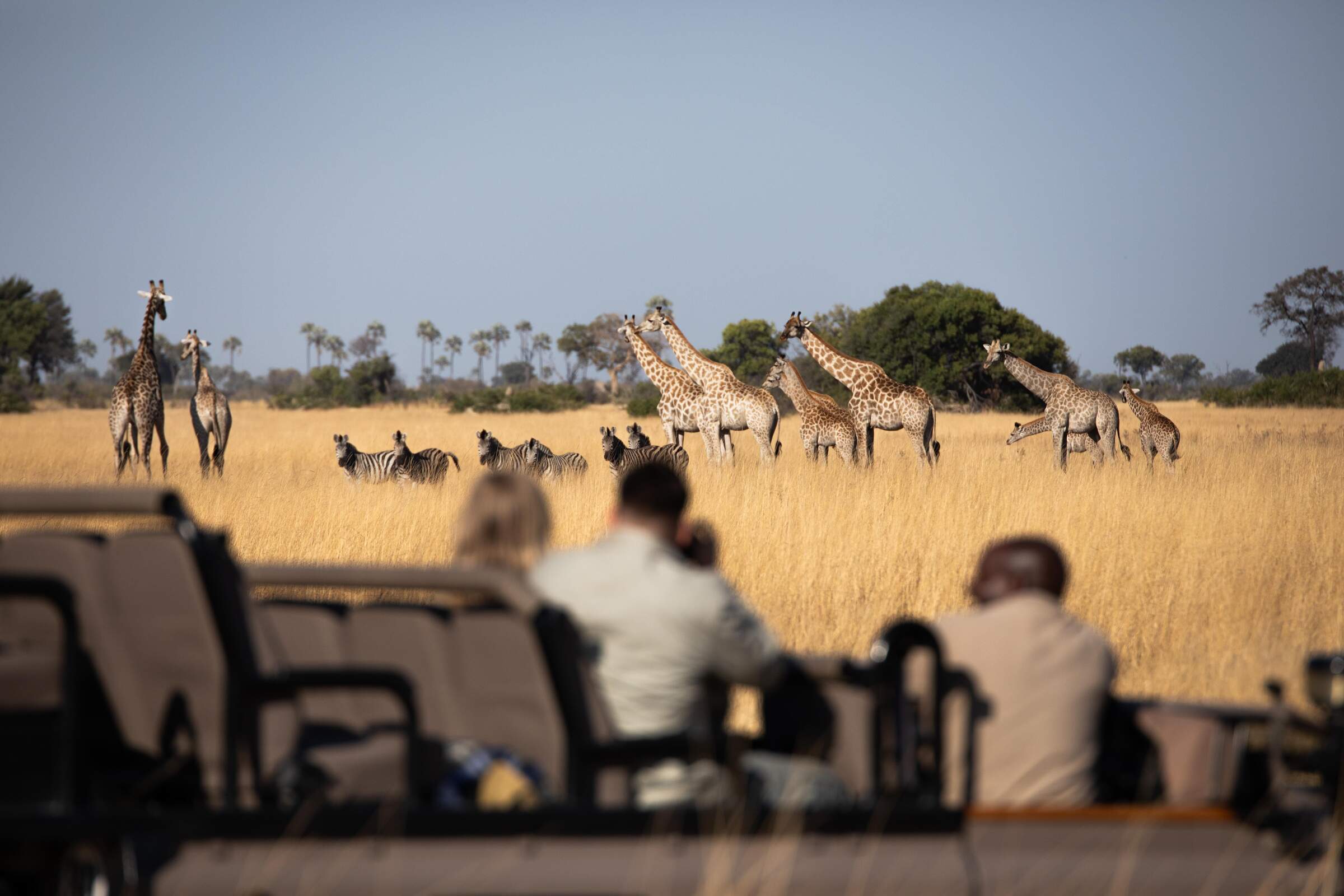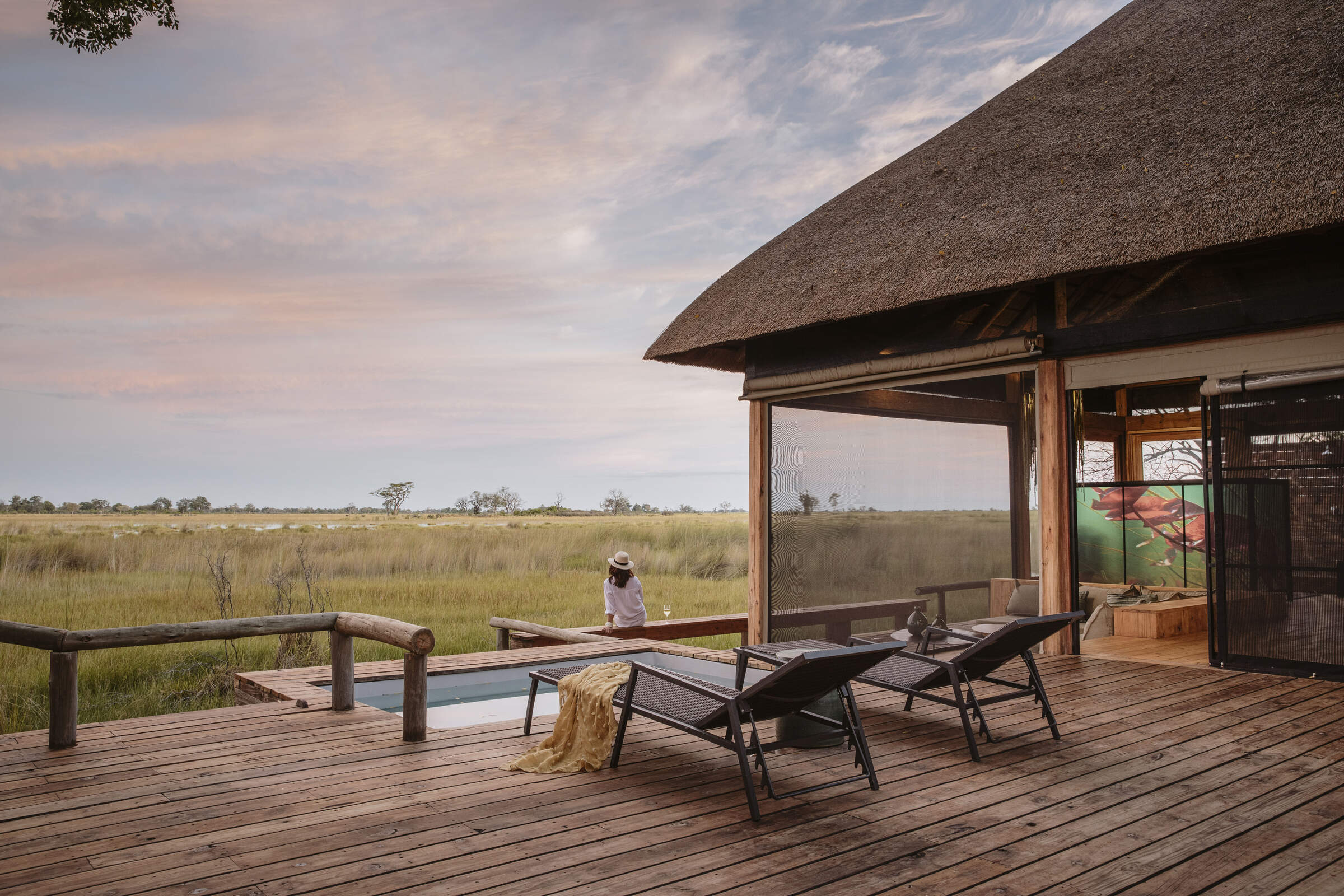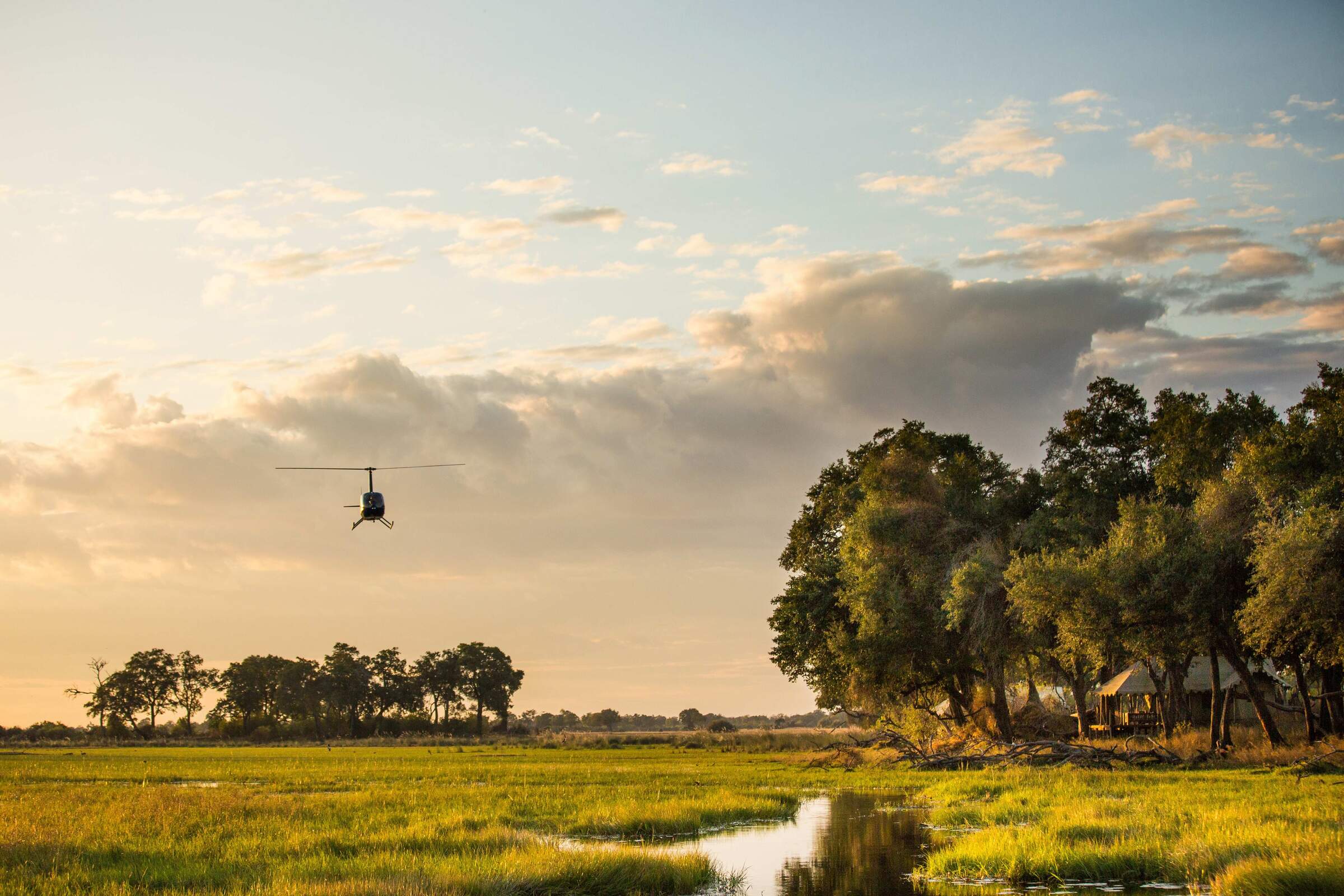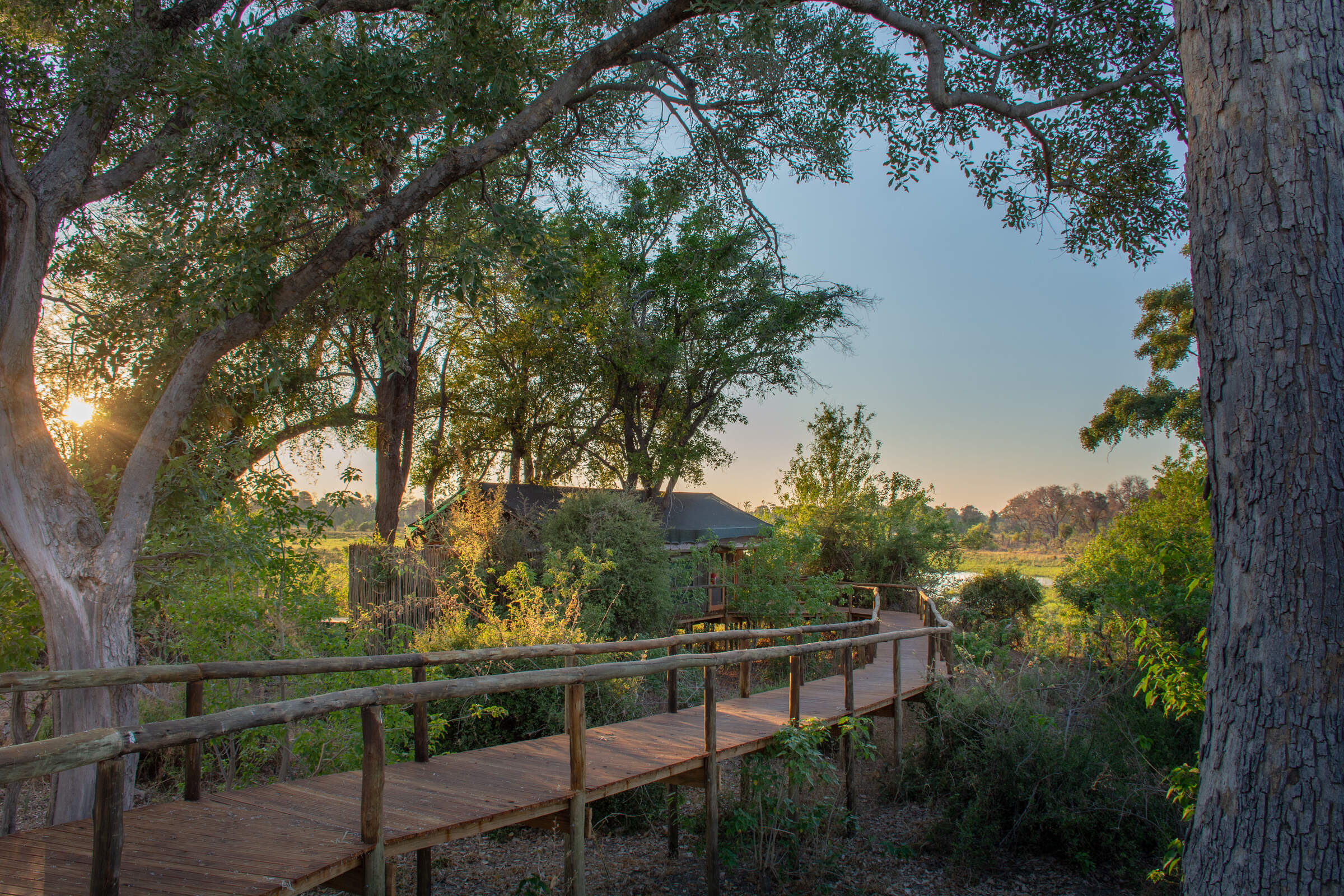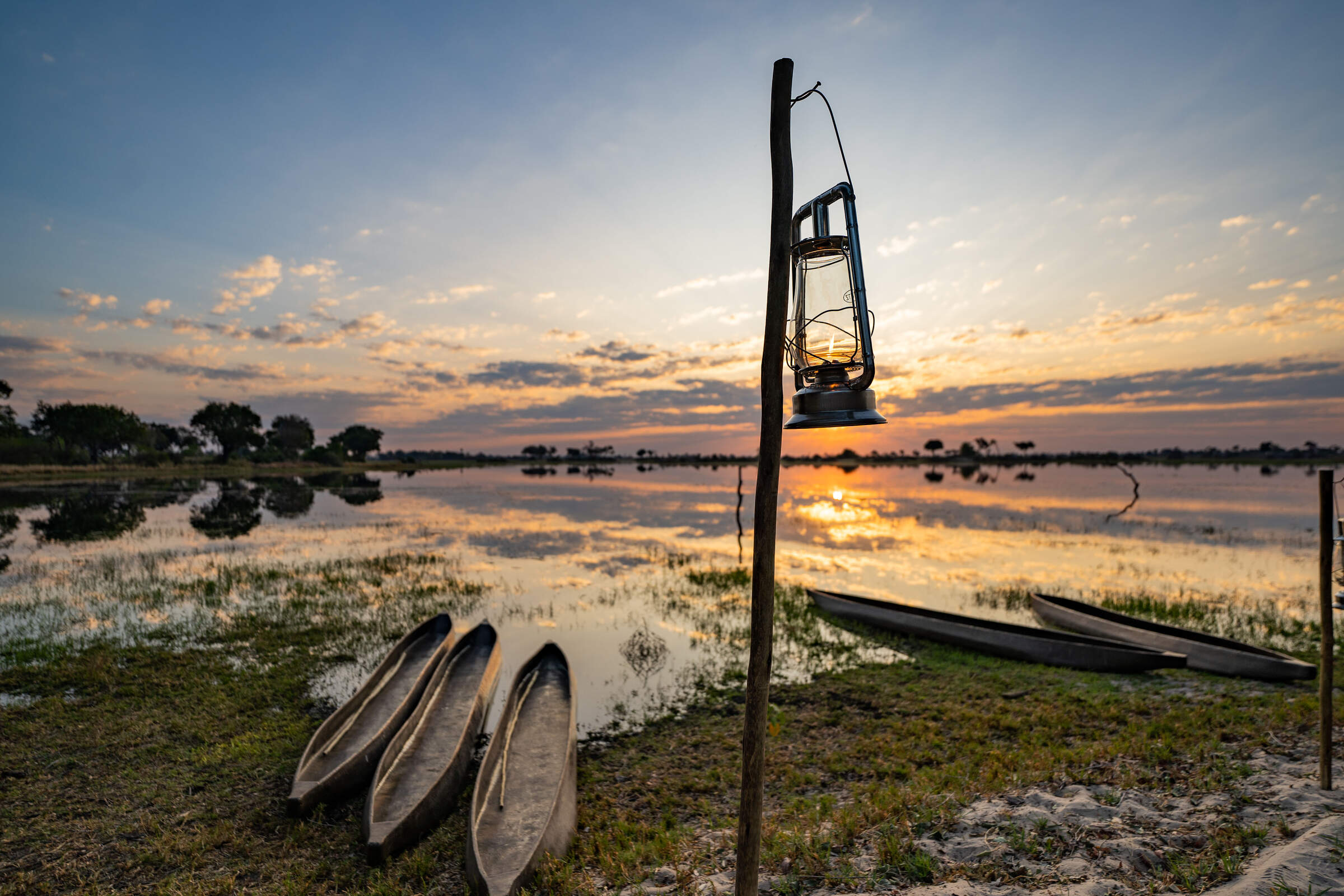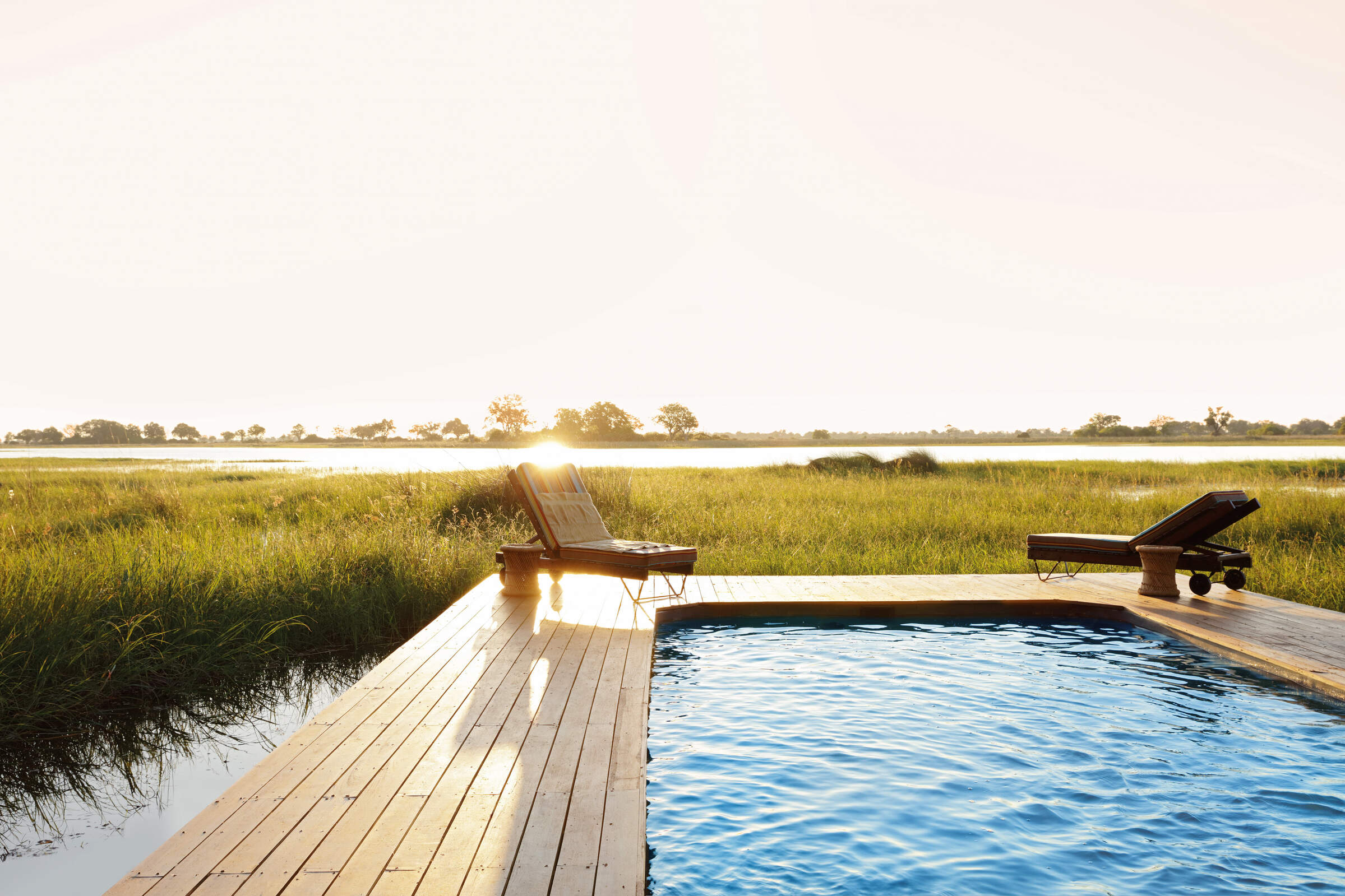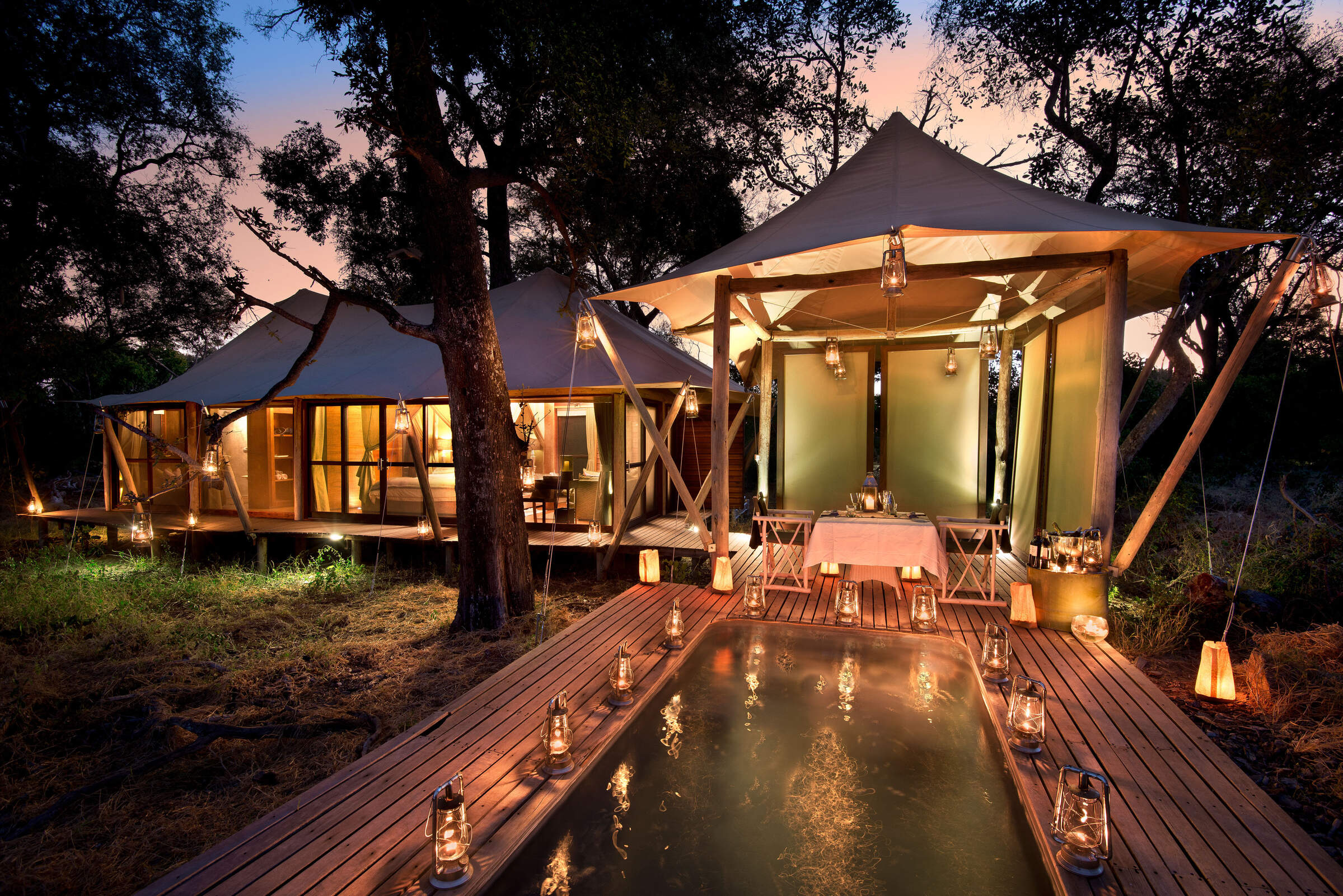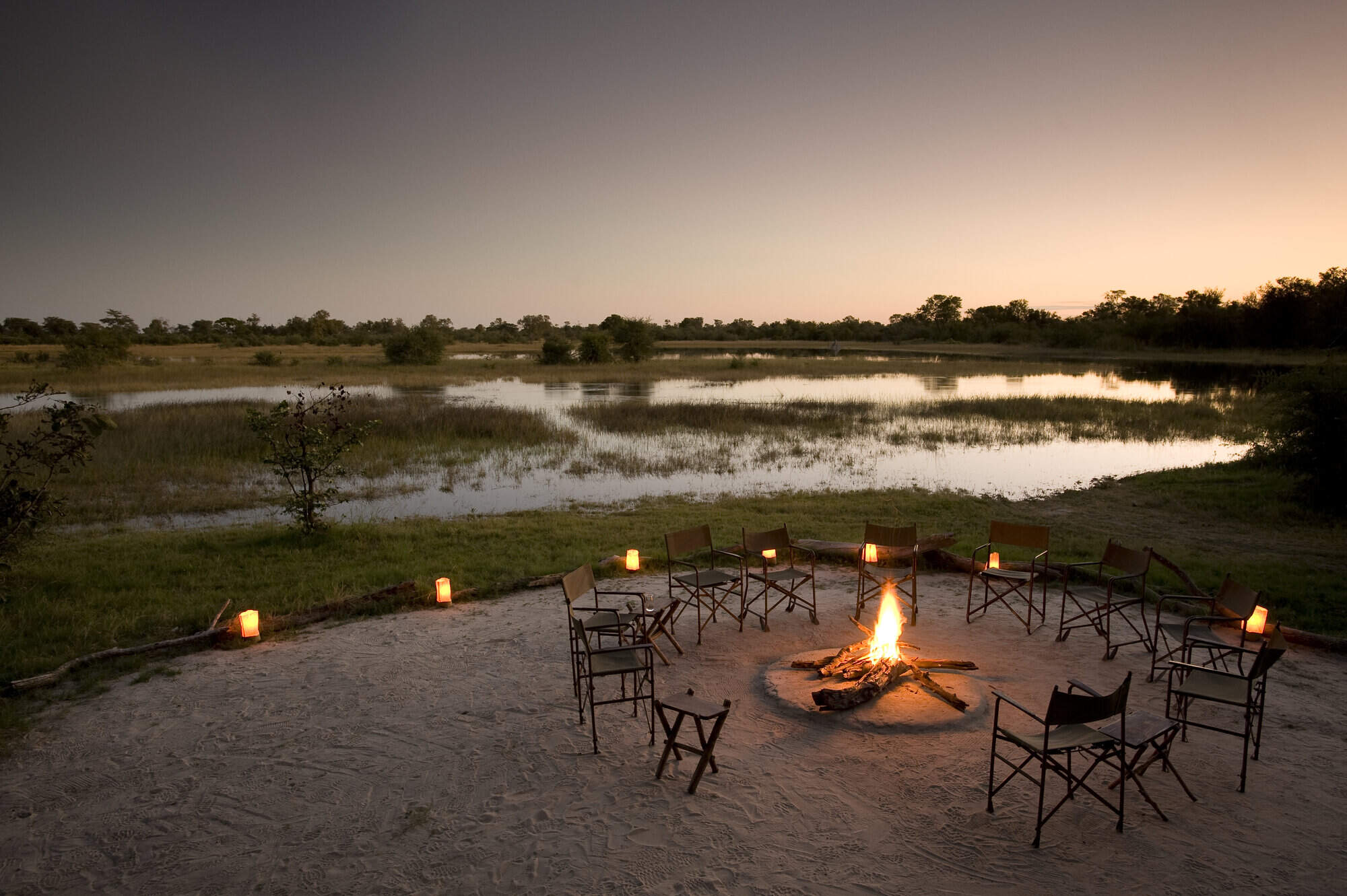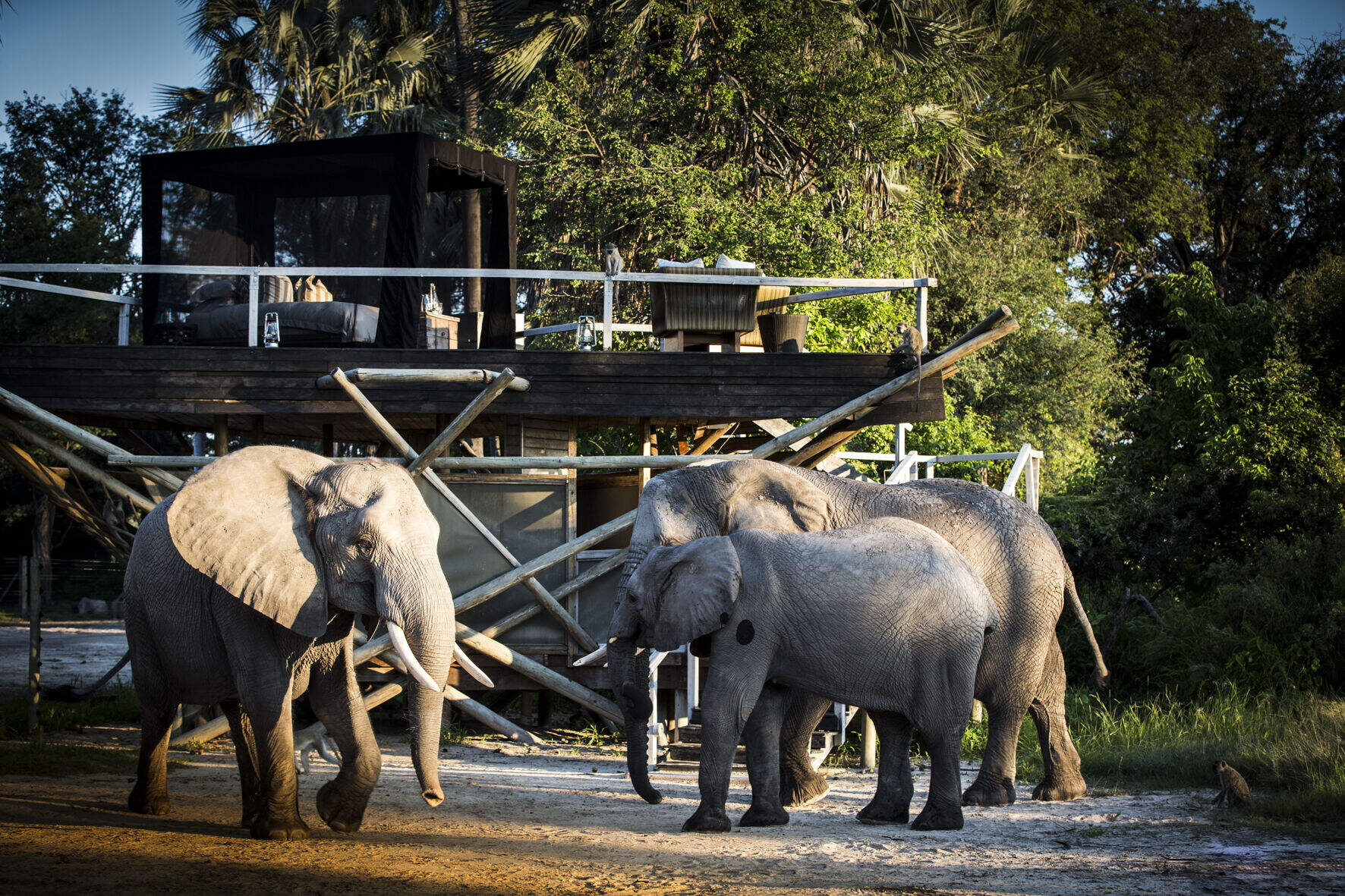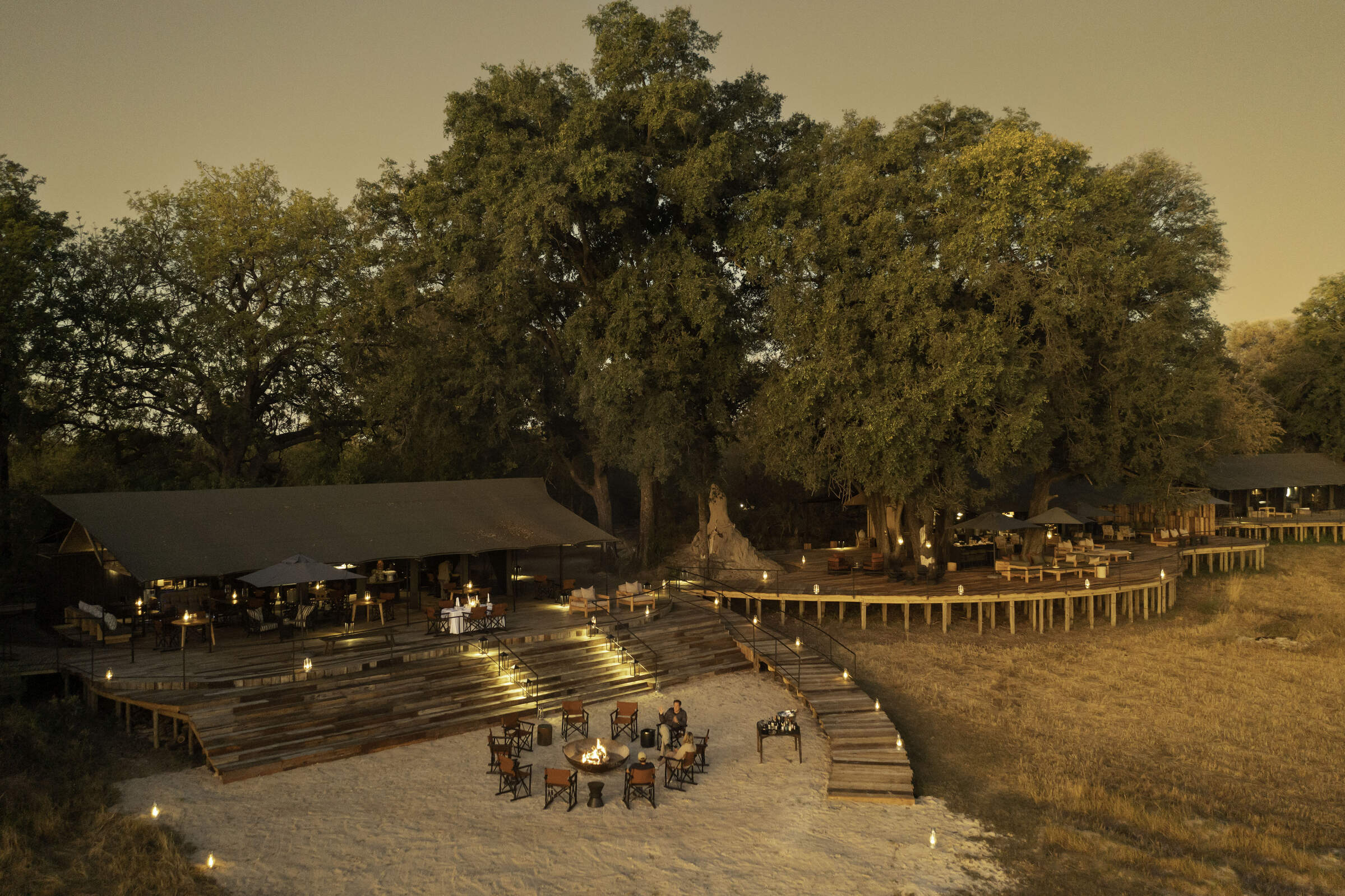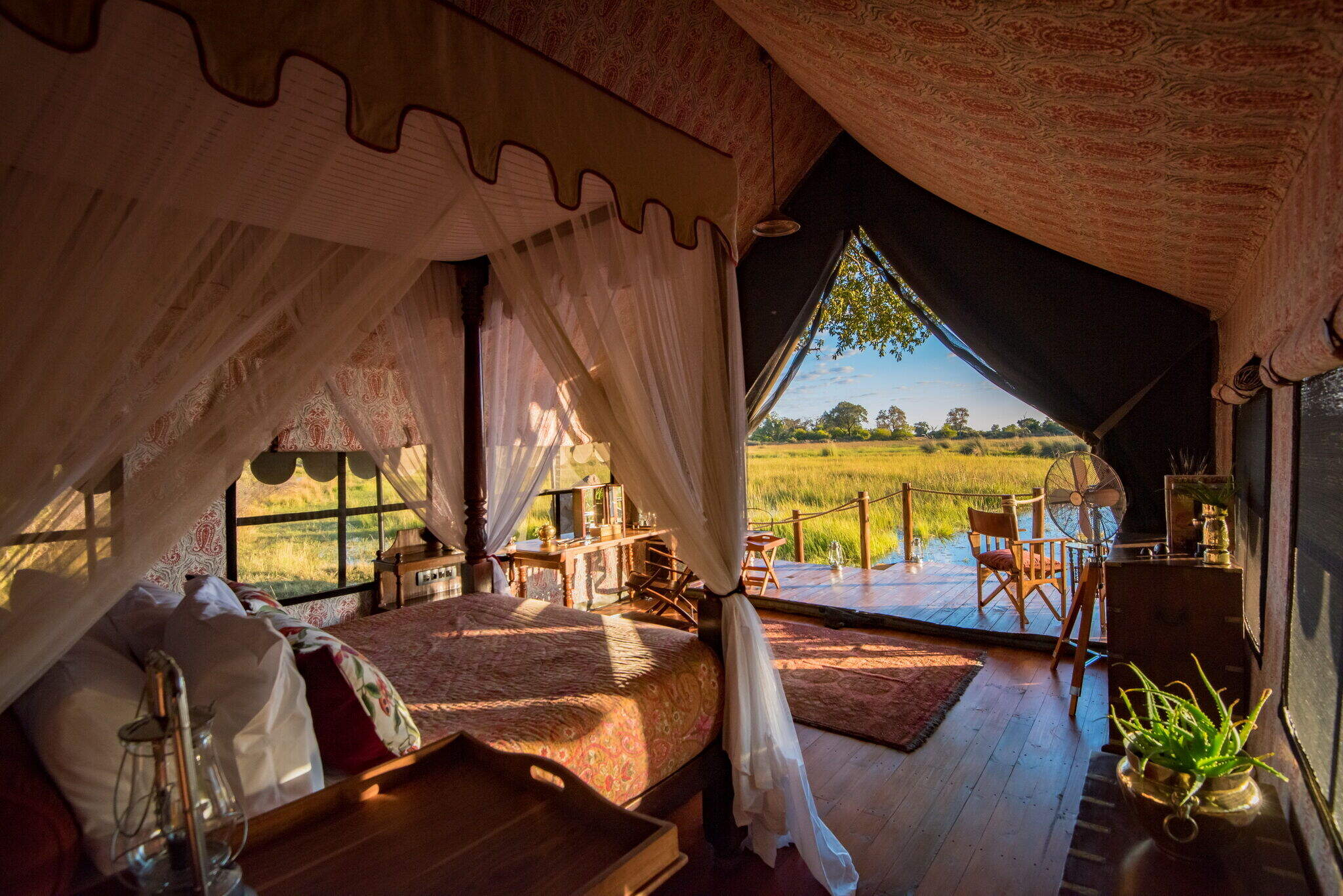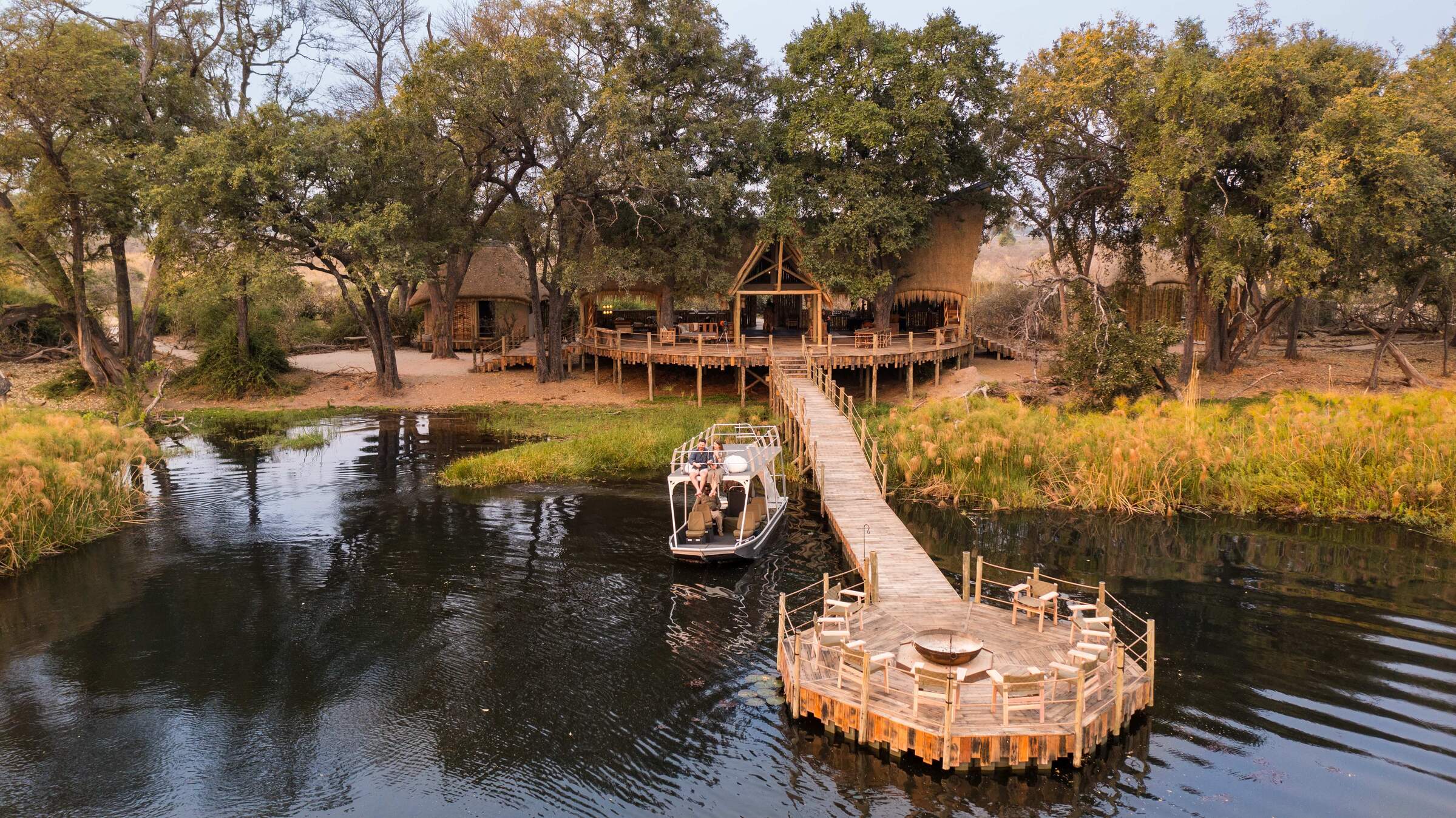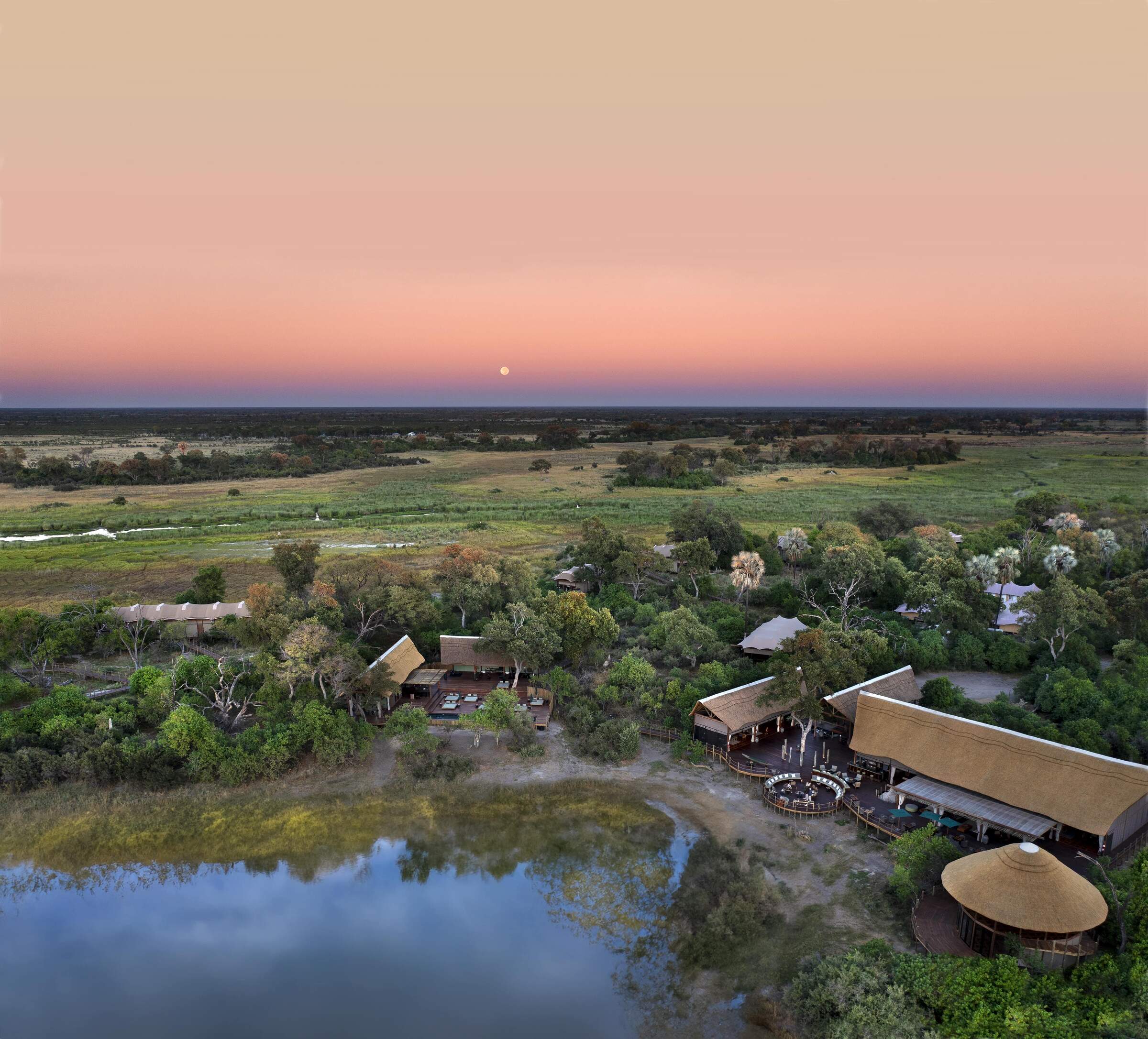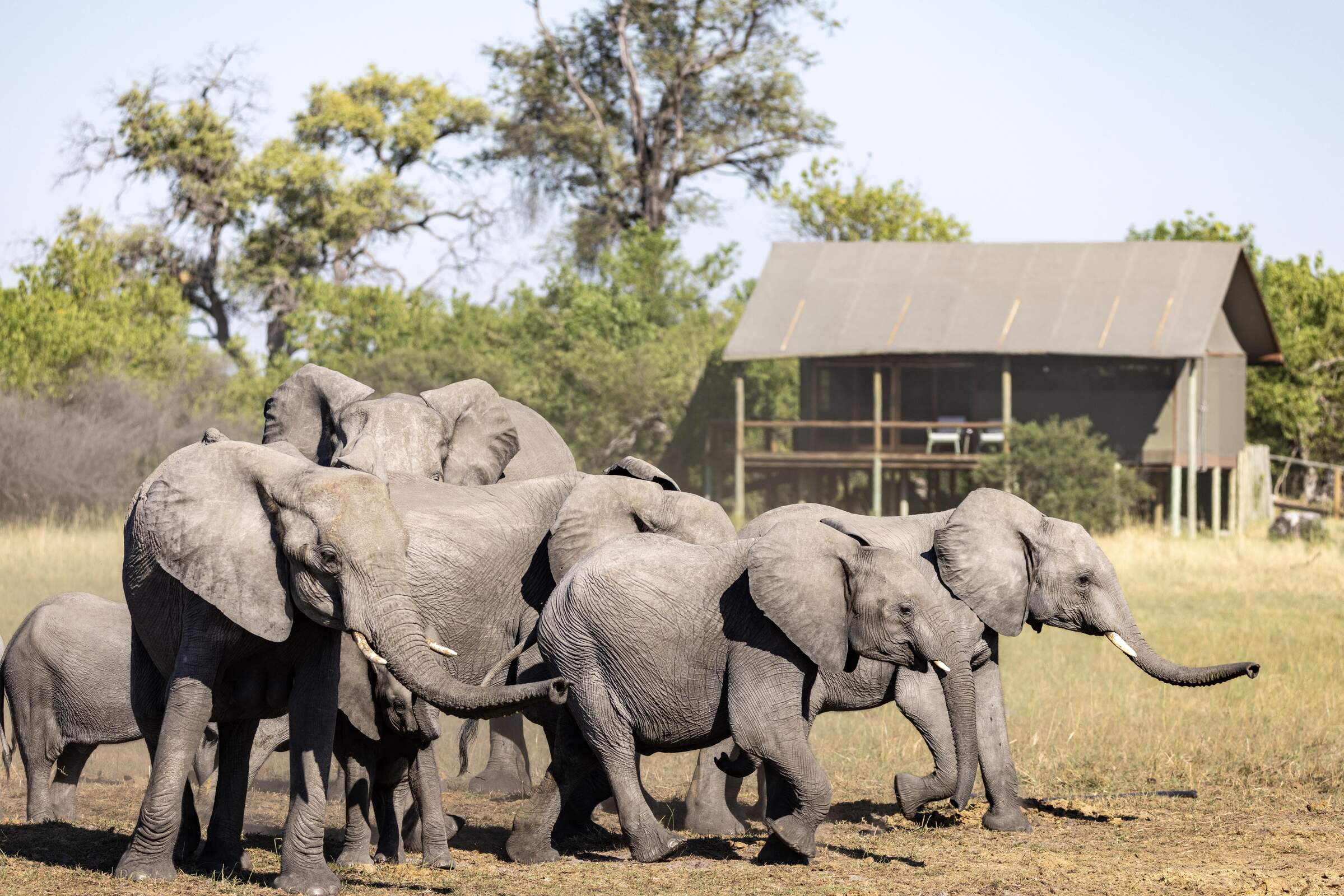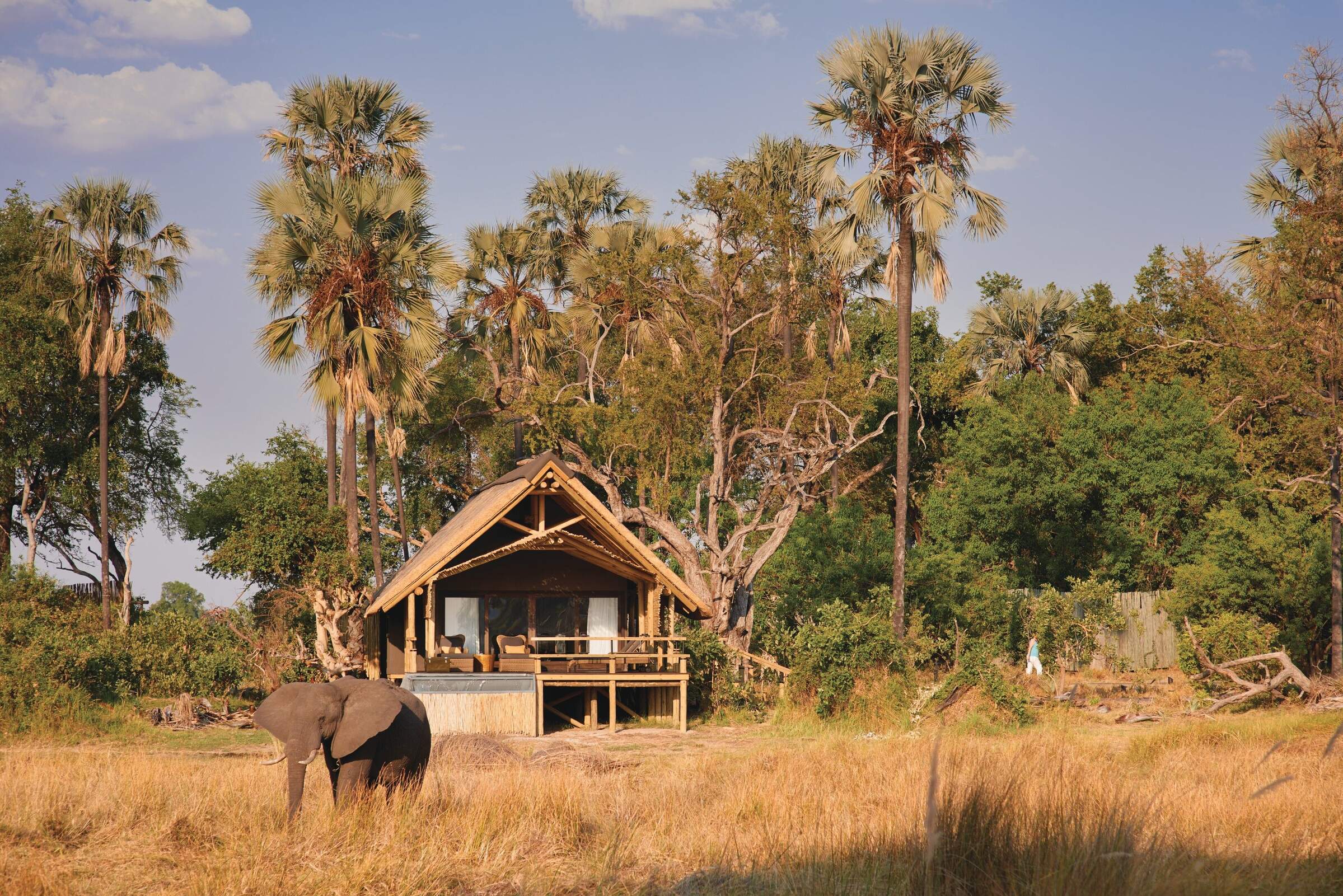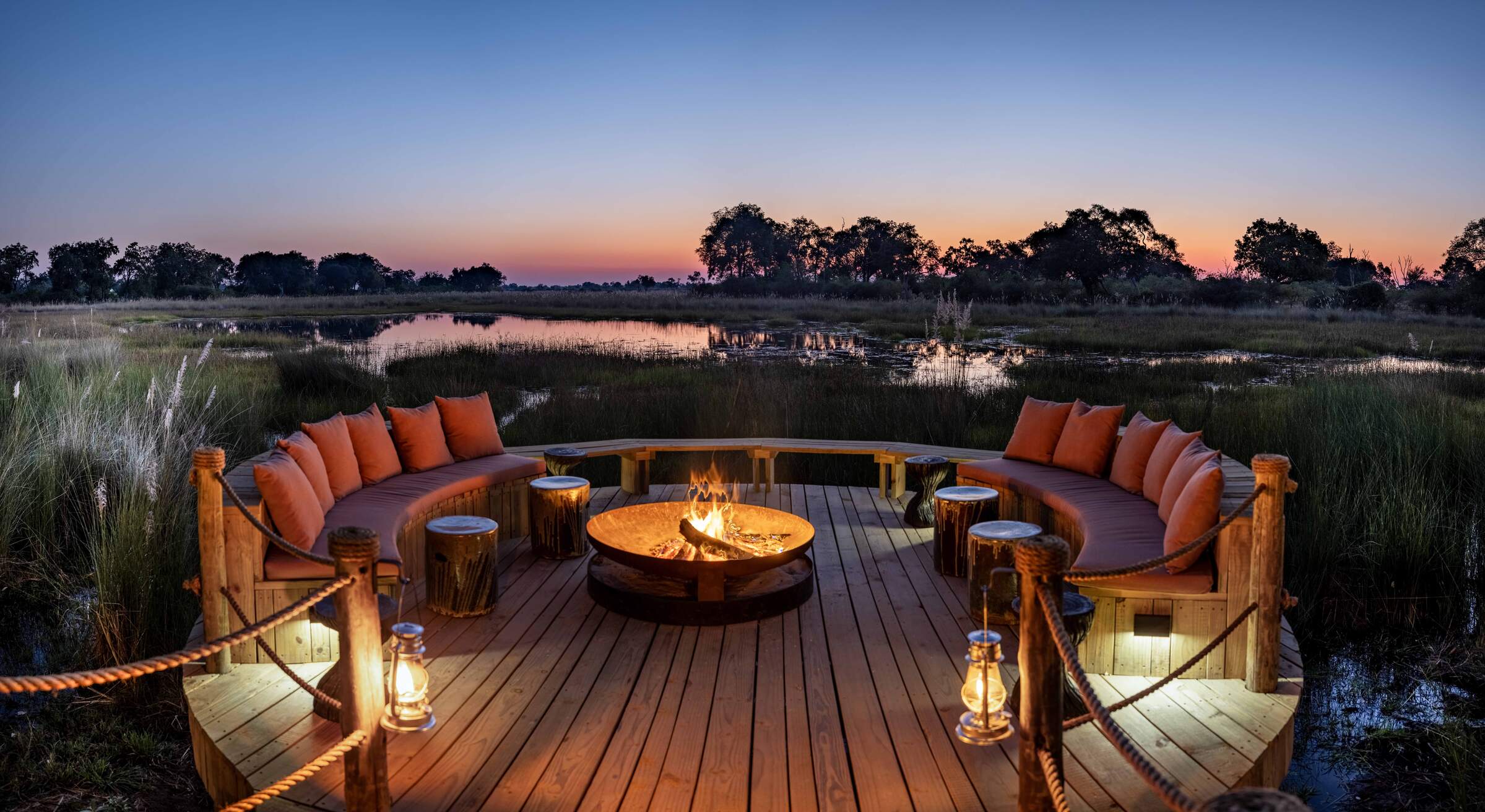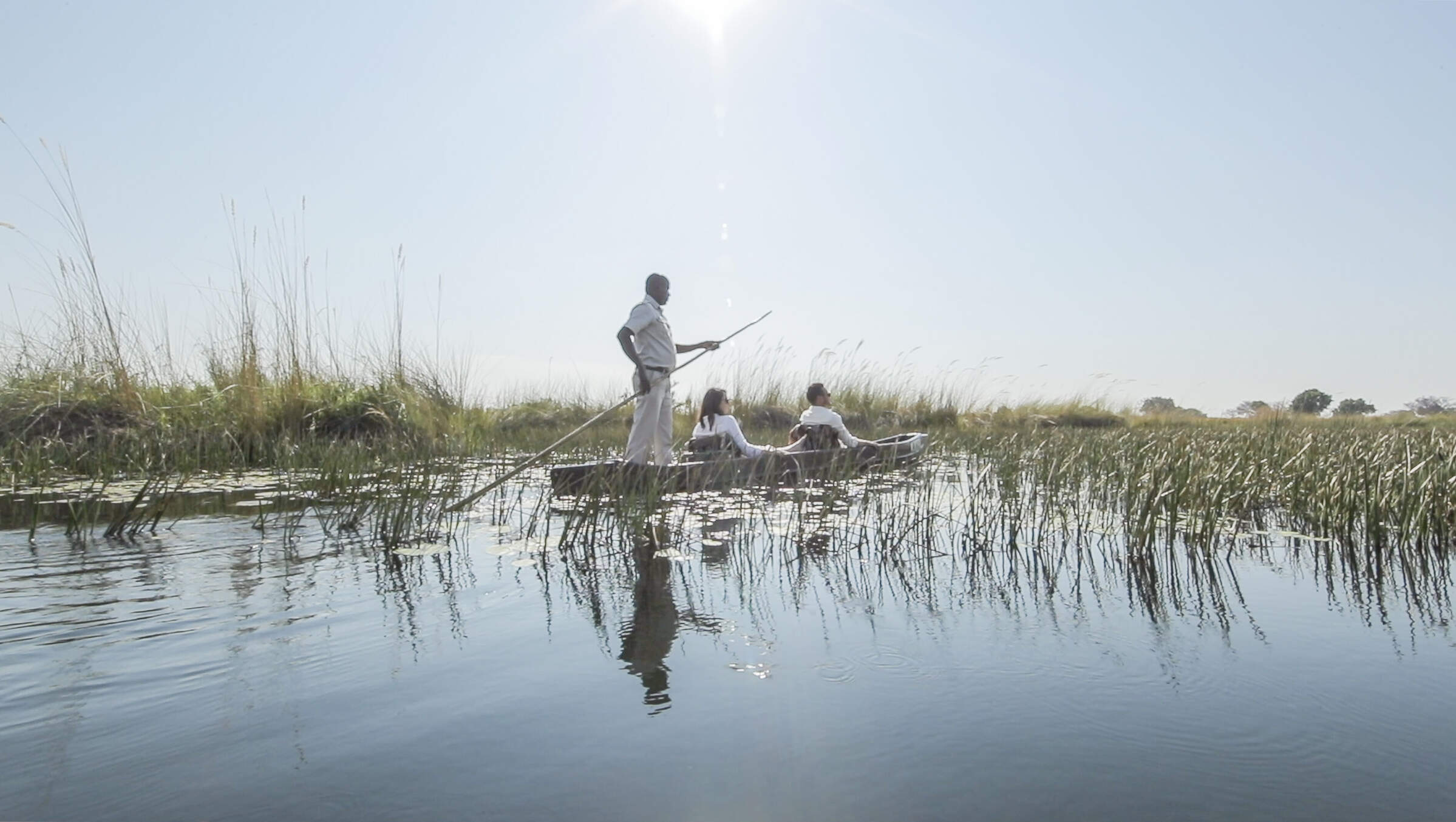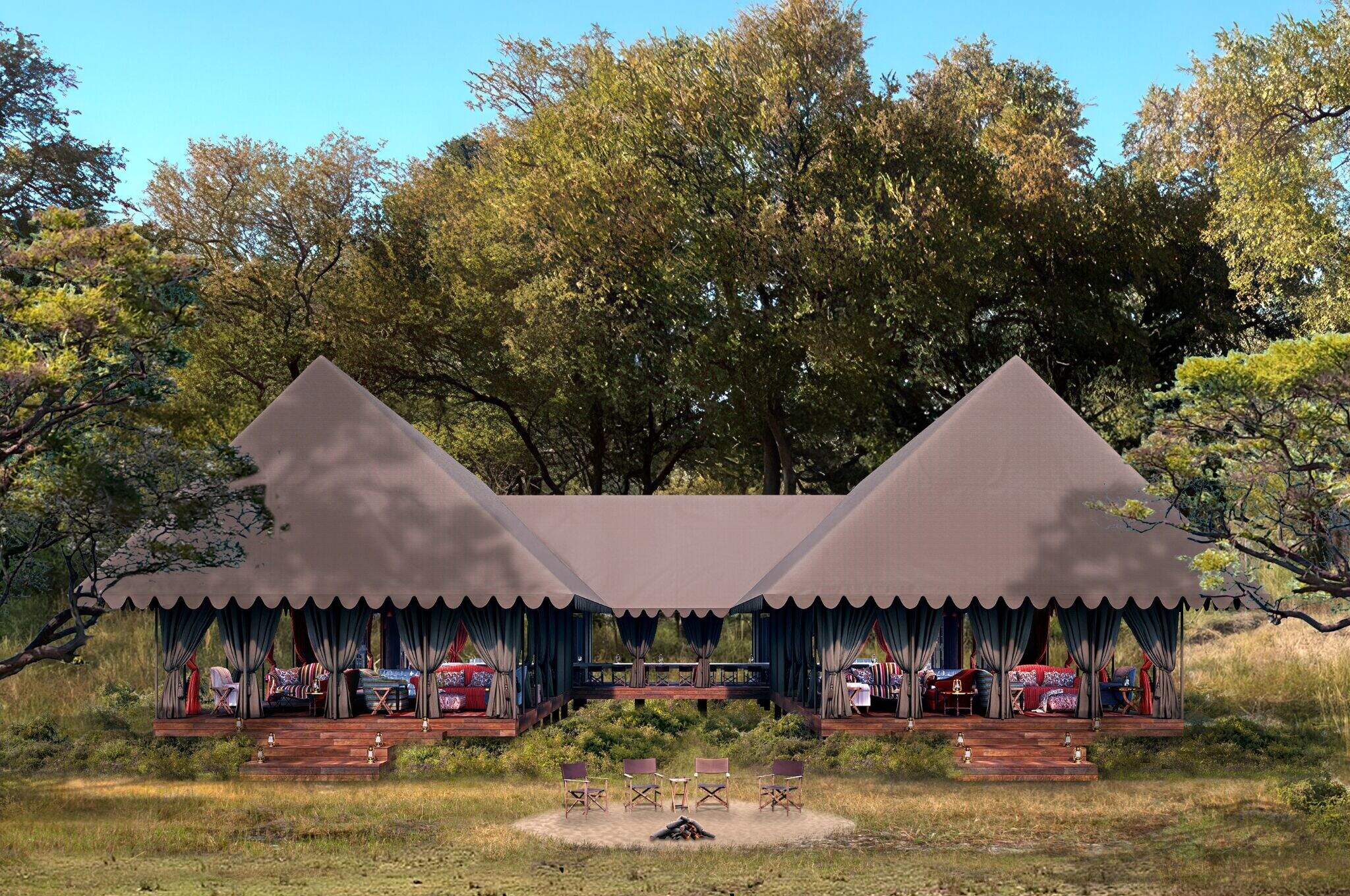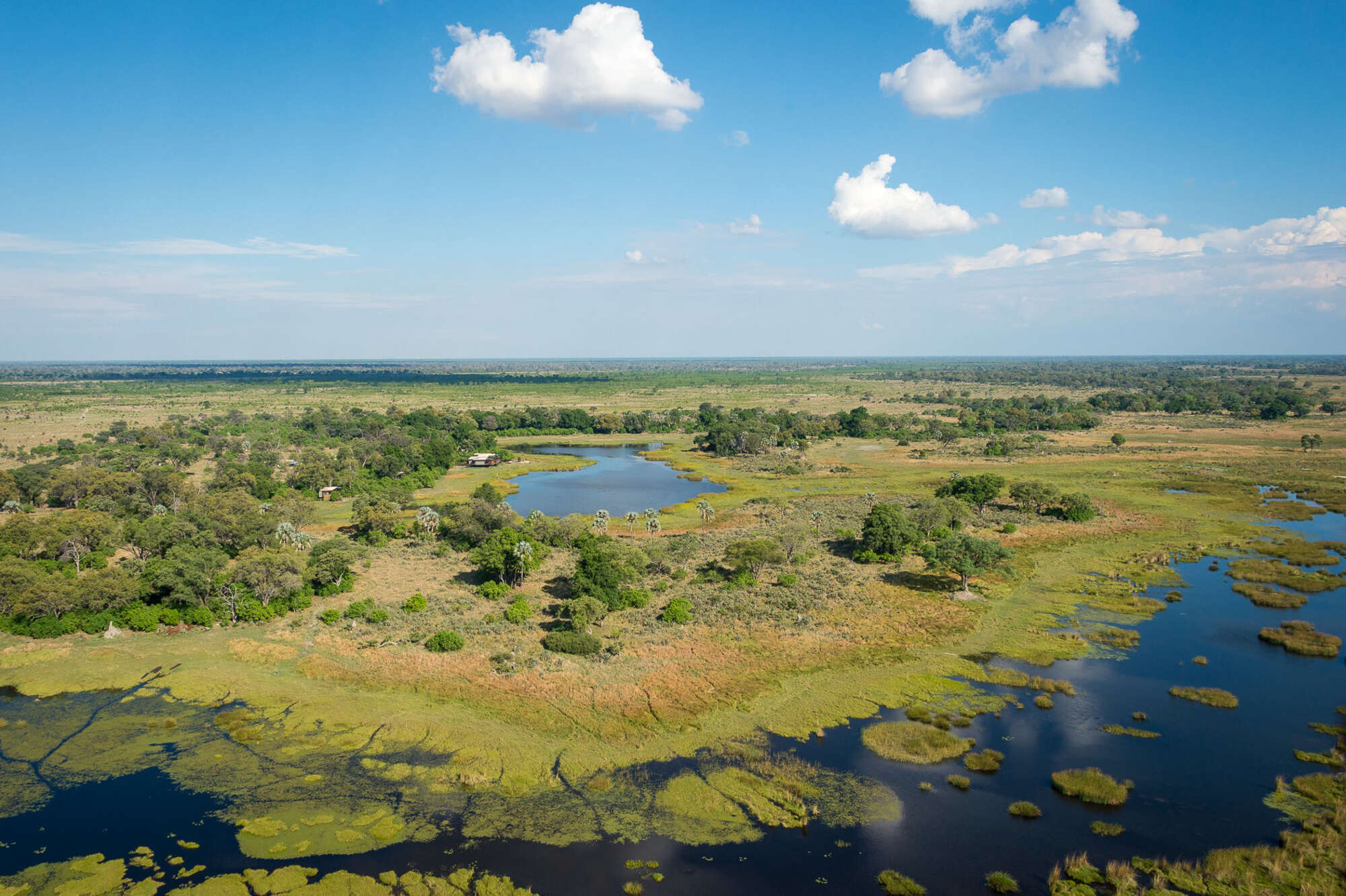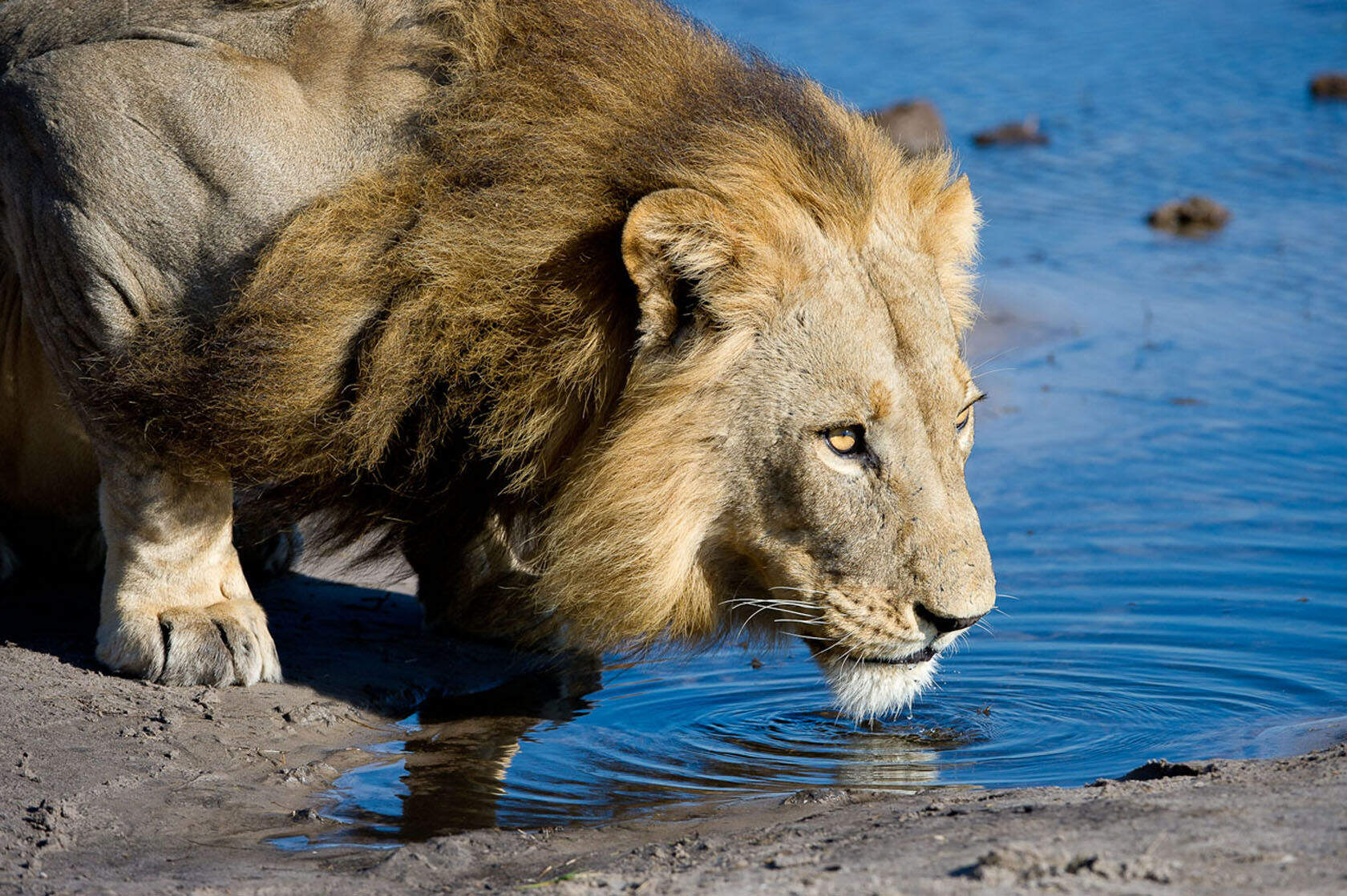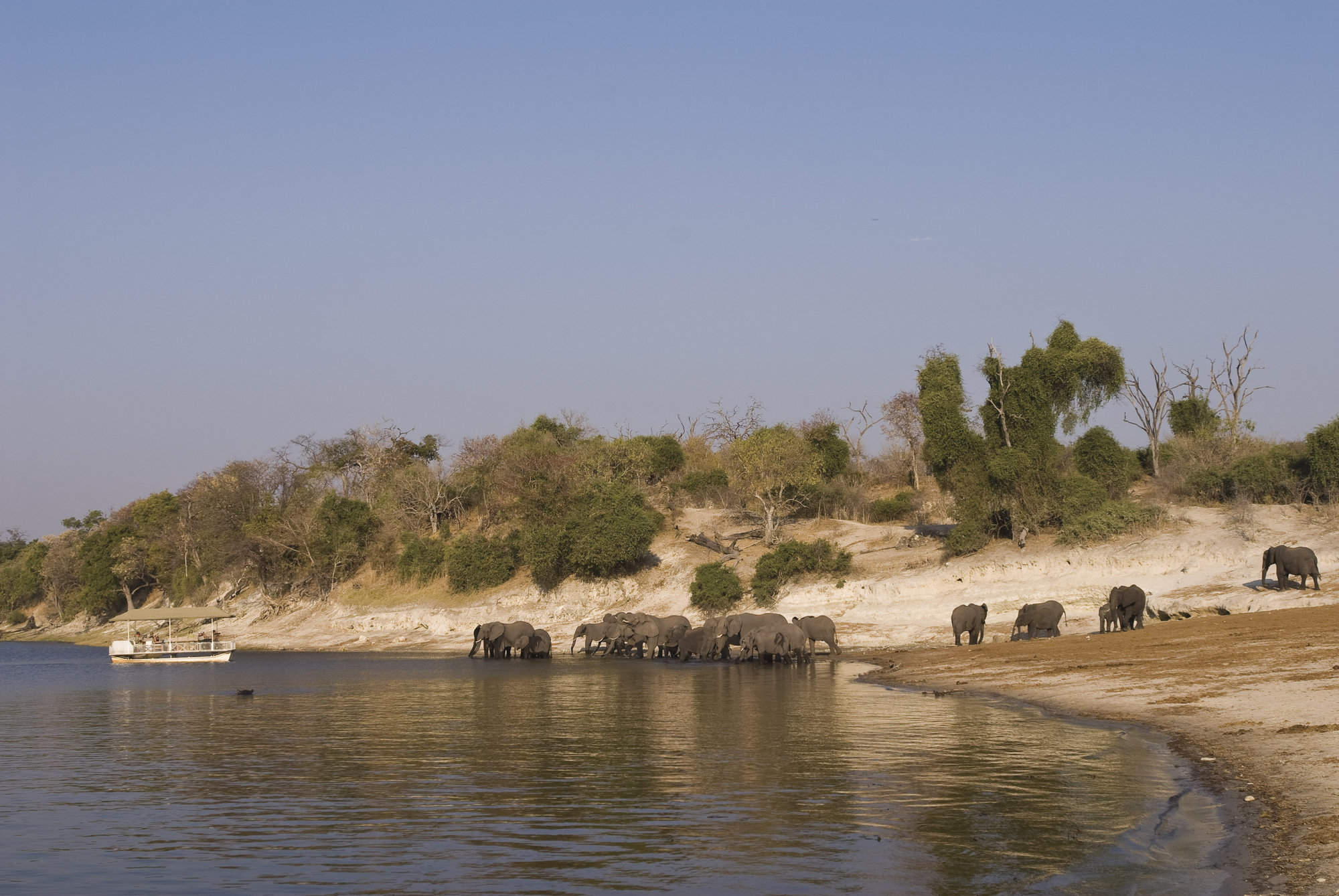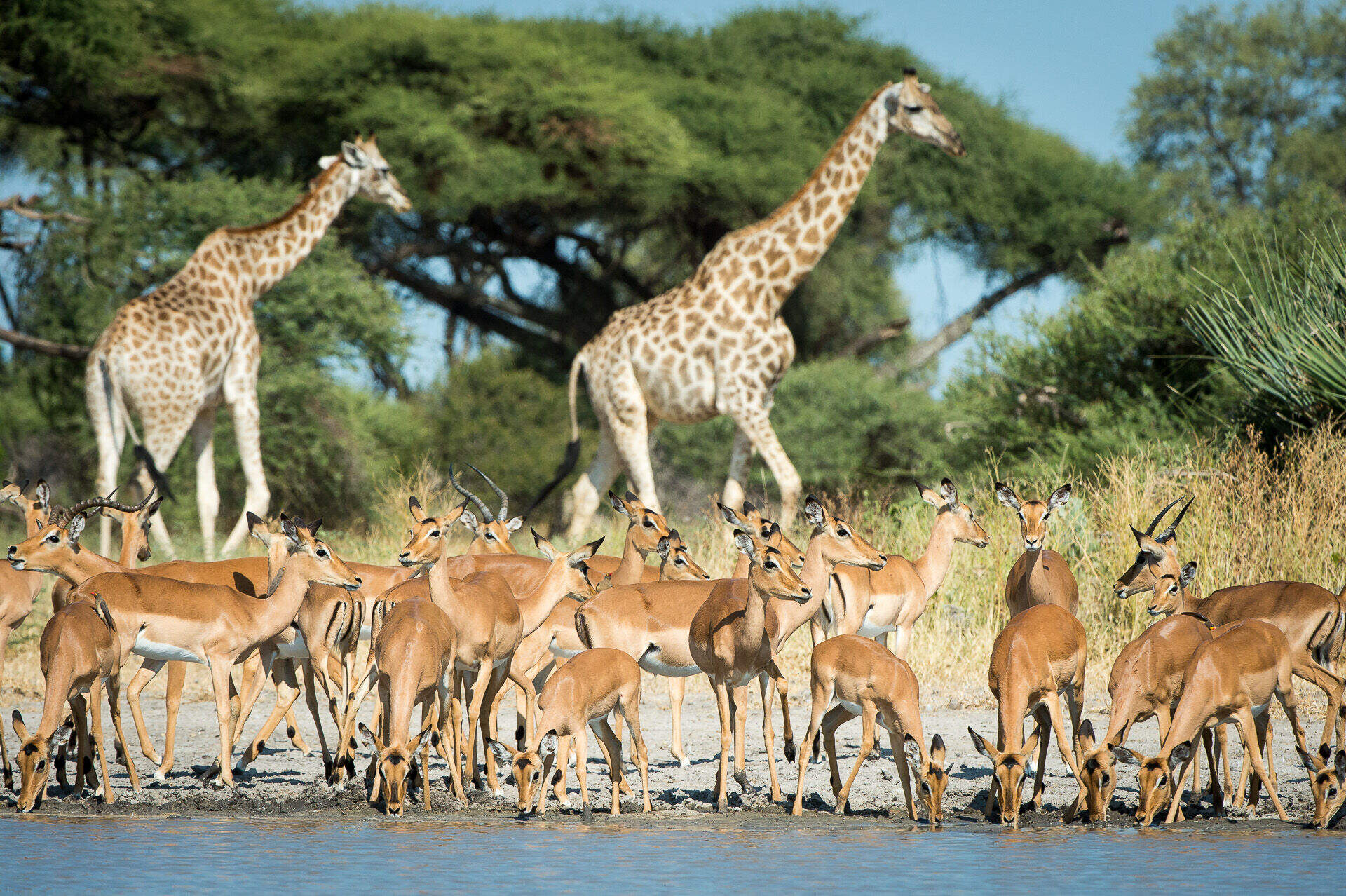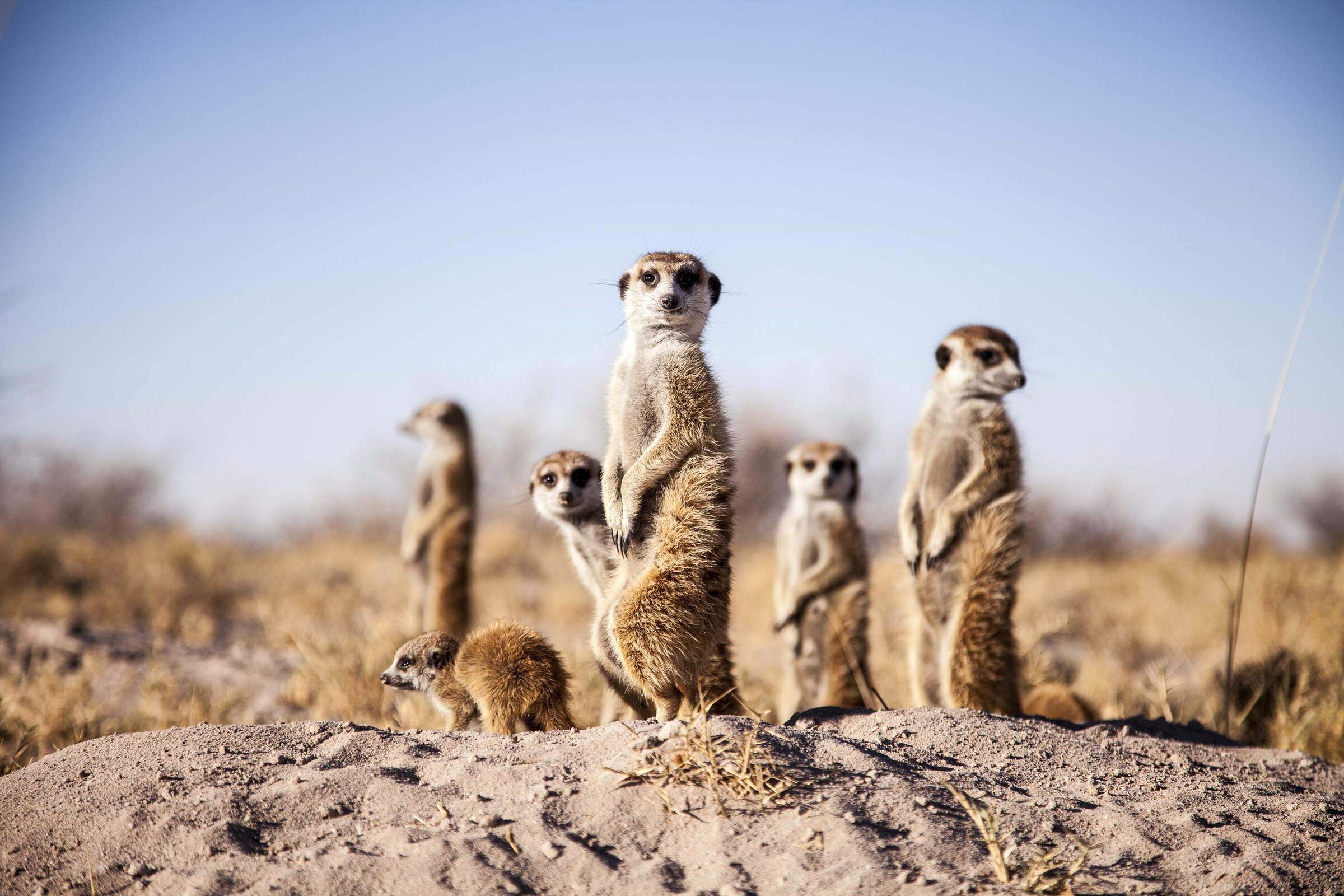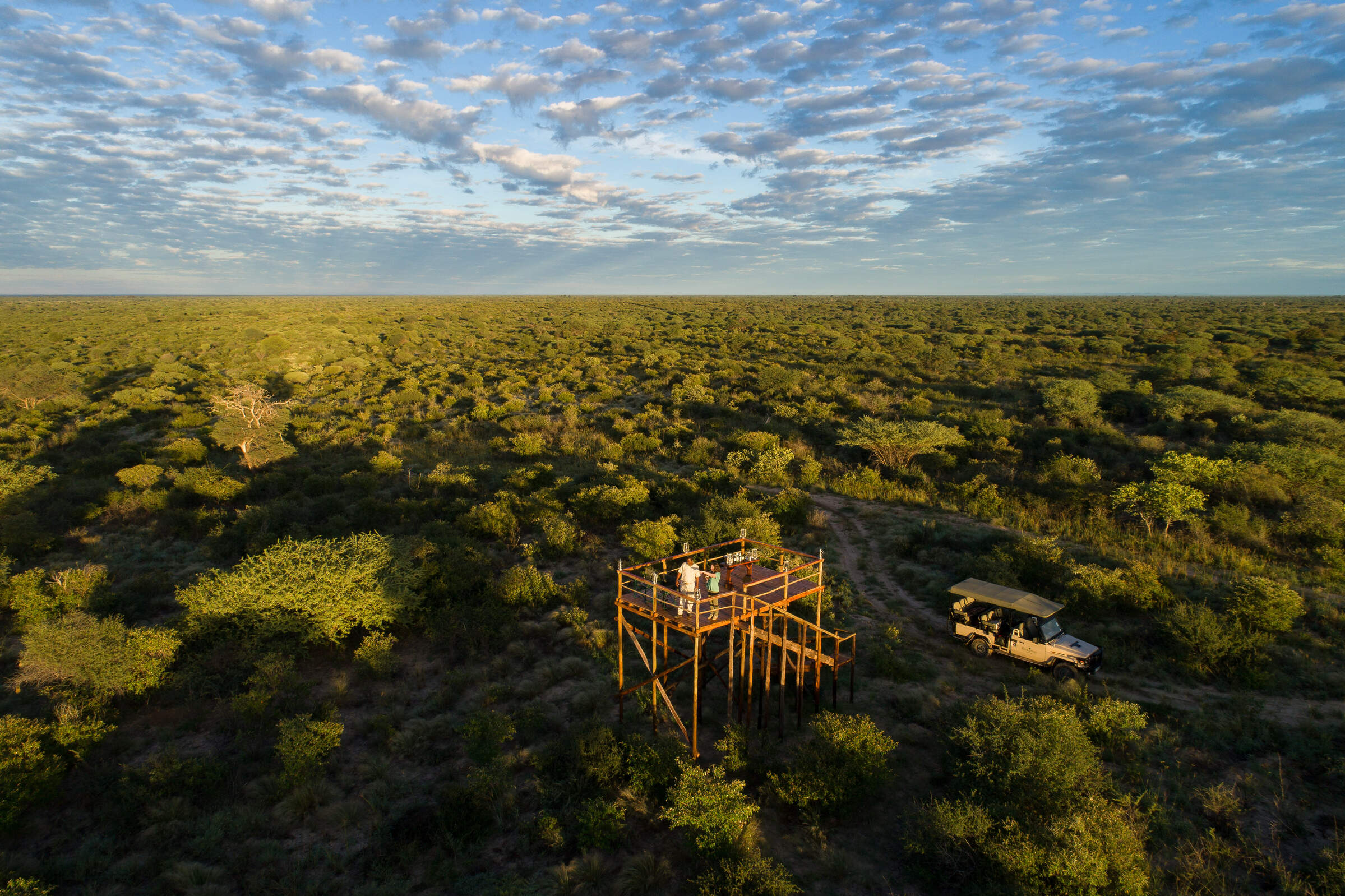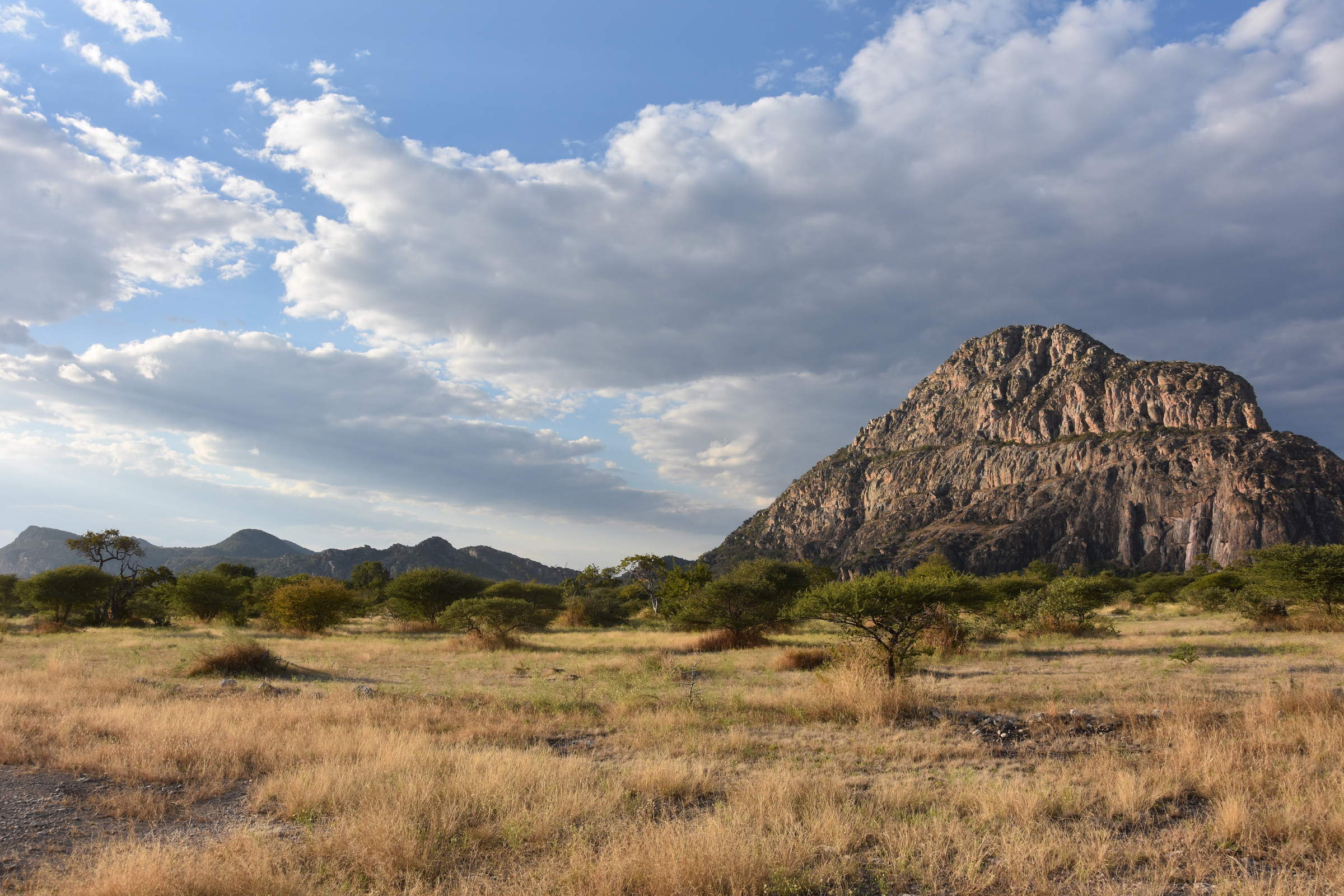Kwetsani Camp: Our full report
The small and luxurious Kwetsani Camp is set on a long narrow island in the beautiful Jao Concession (NG25) ...
... of Botswana's Okavango Delta. Elevated in the treeline, with views over a floodplain, the camp blends almost seamlessly into its surroundings. Although activities in this concession are primarily water-based, there are options for game drives and – with advance notice – walking safaris.Much of Kwetsani, including all the tents and parts of the main area, were rebuilt and refurbished in 2015, giving the camp a smart, fresh feel. On our visit in October 2017, we thought it looked more modern than its neighbouring camps in the Jao Concession, which include Jacana, Jao, Pelo and Tubu Tree Camp
Kwetsani Camp has five 'tree-house' chalets, nestled amongst palm, mangosteen and fig trees, and linked by raised wooden walkways. Spacious, stylish, and built high up on stilts for lovely views of the surrounding area, each is of a high-quality pole-and-canvas construction. All the chalets have a couple of chairs and a table on their verandas, most of which incorporate trees into their design.
At first glance, you could be forgiven for thinking that the chalets are open-sided to the front and sides, courtesy of large windows and glass double doors, which can be concertinaed open to give a bright and airy feel. The airflow is further cooled by the presence of two ceilings fans.
Through a heavy, wooden door leading off the walkway, you are greeted by a large L-shaped sofa, in a plush grey fabric. There’s a desk and a chair, too. along with twin or king-size beds within a large box-shaped mosquito net. Laminated floors, rattan rugs and brushed wood furniture add to the high- end feel, The bathroom is largely open plan, although there is an enclosed toilet cubicle, and the structure housing his and her sinks and a large mirror creates privacy for an indoor shower. A door leads to a second, outdoor shower set beneath the tree canopy and with views of the surrounding plain.
The thatched main area at Kwetsani is completely open on one side, affording good views from the spacious lounge and dining area over the surrounding floodplains. Inside, comfy sofas and various wood, cane and leather armchairs are arranged around heavy wooden tables, where various natural-history books and magazines are provided for guests to browse. The long wooden table is conducive to sociable gatherings at mealtimes, while the well-stocked bar, which encompasses a jackalberry tree, also has a 'help-yourself' fridge – ideal when there isn't a staff member around. There's a well-stocked curio shop, too – and don't forget to try out the quirky 'loo with a view'!
From the large open deck to the front, designed around several mature trees, the views stretch east across the Delta floodplains, so you can watch the sunrise while enjoying an early breakfast. There is a viewing scope for spying the animals, including herds of red lechwe, which often wander in front of camp.
A walkway leads from the deck down to a small swimming pool with sunloungers and umbrellas. One morning, we were treated to an eye-level view of a group of elephants that had been feeding around the pool area – and making quite a lot of noise while doing so! At the other end of the day, guests often meet up for evening drinks around the firepit in the boma, where a traditional dinner is hosted each week.
The terrain in this area of the Okavango Delta changes dramatically from season to season due to the flood levels, which in turn determine what safari activities are available at Kwetsani Camp. These usually include game drives on nearby Hunda Island (the Jao Concession's main permanently 'dry' area, and the focus for game viewing), and trips by mokoro and motorboat, but all of these can occasionally be limited by water levels. Kwetsani also offers guided walks, though it is worth requesting these in advance to confirm the availability of a suitably trained guide.
With the diversity of habitats around Kwetsani Camp comes a broad range of animals and birds. Of the birds, look out for slaty egrets, saddle-billed storks, malachite, pied and woodland kingfishers, bee-eaters, Swainson's francolin, black-winged stilt, red-shouldered widow and, of course, the magnificent African fish eagle.
The Jao flats support large herds of red lechwe, buffalo, wildebeest and zebra – and where you find these, you'll also find lion! Nearby Hunda Island attracts elephant, kudu, giraffe, and other plains game – though note though that as this is the best place for game drives on the reserve, you are likely to see vehicles from other camps. When flood levels are low (generally October to April), day and night game drives should be possible in the area close to camp.
During our recent visit, we found the game drive to Hunda Island a little limiting, as a boat trip is required to get to and from the island and you must return before dark because of the risk posed by hippos. On a previous trip, however, we spent a fantastic hour watching a young male leopard stalk a herd of red lechwe – only to be given away by the alarm call of a blacksmith plover after he had painstakingly inched towards them through the tall grass.
Despite this, don't come to Kwetsani expecting the best game viewing in the Delta. Instead, with the diversity of flora and fauna and potential for land and water-based activities, you can get a really good feel for the essence of the Delta.
Our view
Kwetsani Camp stands out for its lovely location and design, and its very relaxed atmosphere. The range of activities is slightly more dependent on the floodwaters here than it is in most drier concessions, and the levels of game are not as good as elsewhere in the Delta, none the less this small camp is a lovely place to spend a couple of nights at the beginning or end of any trip.
Geographics
- Location
- Okavango Delta Safari Reserves, Botswana
- Ideal length of stay
- Two to three nights, depending on the time of year.
- Directions
- Guests fly in to Jao airstrip, then are usually transferred to camp by boat, although this could be by vehicle if the floodwaters have receded sufficiently.
- Accessible by
- Fly-and-Transfer
Food & drink
- Usual board basis
- Full Board & Activities
- Food quality
- The food at Kwetsani is served buffet-style and is generally of a good standard, as it was during our last visit in October 2017. Children and vegetarians are catered for on request.
A light pre-activity continental breakfast consisted of a selection of cereals, toast, muffins, fruit, yoghurts and tea and coffee.
Brunch at Kwetsani is served upon returning from the morning activity. Unfortunately we missed this on our last visit, but it usually consists of a cooked breakfast, another hot dish, a selection of salads, fresh bread and fruit.
High tea is served prior to your afternoon activity. In the past we have particularly enjoyed tasty breaded chicken strips, accompanied by a sweet chilli sauce, and mini caramel tarts.
For dinner, our starter of a pumpkin puff-pastry tart was followed by the choice of either venison cobbler or lemon-roasted chicken served with rice, bean salad, roasted carrots and a Greek salad. For dessert we enjoyed a coconut panna cotta with caramelised pineapple.
Once a week, the camp holds a 'traditional' night, which we were lucky to experience on a previous visit. One of the guides spoke about their traditions and culture, and the staff choir sang beautifully. This was then followed by a traditional dinner of shredded beef, mealie pap (basically ground corn, similar to mashed potato, but thicker in consistency), tomato and onion sauce, butternut, cabbage and corn on the cob. For pudding we had a 'Botswana doughnut' with honey. - Dining style
- Group Meals
- Dining locations
- Indoor and Outdoor Dining
- Further dining info, including room service
- Room service is not available
- Drinks included
- Bottled water, soft drinks, local beers and spirits and a limited selection of (usually) South African red and white wines are included. Champagne and imported wines and spirits will cost extra and may need to be requested in advance.
Filtered drinking water is provided in the rooms and there is a central water vessel to refill bottles.
Children
- Attitude towards children
- Children aged 12 years and over are welcome at Kwetsani Camp and we felt that the managers were particularly positive about receiving children. They may accept children aged 8–12 if the whole camp is booked out exclusively.
- Property’s age restrictions
- Only children over the age of 12 are accepted as standard.
- Special activities & services
- Fishing trips and craft activities (such as candle-making) can be arranged for children, and special meals can be organised.
- Equipment
- None
- Generally recommended for children
- We don't think that Kwetsani is suitable for young children. The chalets are on high stilts, connected by raised walkways, with plenty of open drops through which a child could fall. Also, rooms cannot easily accommodate a third bed.
- Notes
- Kwetsani is a very open camp with dangerous wildlife in the area and it is open to the water in the flood season, so parents must supervise their children at all times.
Communications
- Power supply notes
- The camp uses a generator and inverter system. It's generally an efficient system but note that hairdryers draw too much power and cannot be used.
- Communications
- There is no mobile reception, no direct phone or fax and no email at Kwetsani. Contact in case of an emergency is via radio to Maun.
- TV & radio
- No television or radio
- Water supply
- Borehole
- Water supply notes
- The showers are fully plumbed and the toilets are flushable.
Sustainability

Mitigating human – wildlife conflicts
Over 150 people in Tubu village still depend on the natural resources near the Thaoge river. However, the progressive drying of the river has forced villagers to intensify the use of the Karongana system which is located partly in the Wildlife Management Area (WMA). This has created conflicts between locals and concessionaires. As a solution, the University of Botswana implemented a project called ‘Biokavango’, and in 2007, representatives from the Local Community, Government Departments, Private Sector and Non-Governmental Organizations agreed to setup a Joint Management Committee (JMC), to reduce conflict between the community and the Jao Concession – specifically with regard to curbing poaching and over-fishing.
Kwetsani Camp has been involved in the program from the very beginning and its main responsibility is to maintain order and compliance with the regulations of the JMC management plan. The camp works in collaboration with the Community Rangers in the nearby areas who are trained to monitor resources, activities and unforeseen events or threats to the local wildlife or community.
See more great sustainability projects in Botswana
Health & safety
- Malarial protection recommended
- Yes
- Medical care
- All camp managers are first-aid and trauma trained and various medications are kept at camp. Wilderness have an affiliated nurse who is based in Maun and can always be contacted for further medical advice. In an emergency, clients can be flown out, if necessary, but please note that it is only possible to fly out of camp during daylight hours as the bush airstrips do not have any lighting at night.
- Dangerous animals
- High Risk
- Security measures
- Because of the Okavango's large population of dangerous game, and the fact that Kwetsani is unfenced, guests are escorted to and from their rooms after dark. 'Horns' are provided in the rooms to be sounded in case of an emergency.
- Fire safety
- There are fire extinguishers on the verandas of all chalets.
Activities
4WD Safari
Birdwatching
Boat trip
Fishing
Guided walking safari
Helicopter
Mokoro
Night drive
Private activities
Extras
- Disabled access
- On Request
- Laundry facilities
- Laundry is included at Kwetsani and is collected in the morning and usually returned the same day, weather permitting. For cultural reasons, the staff do not wash underwear, but washing powder is provided in the rooms for this purpose.
- Money
- No exchange facilities are offered. There are safe deposit boxes in the rooms.
- Accepted payment on location
- Mastercard and Visa credit cards are accepted; Diners and Amex are not. Credit-card transactions are limited to a minimum of P200 (Botswanan pula), but no commission is charged. Cash payments may be made in South African rand, pounds sterling, US dollars, euros and Botswana pula.
Other lodges in Okavango Delta Safari Reserves
Alternative places to stay in this same area.

